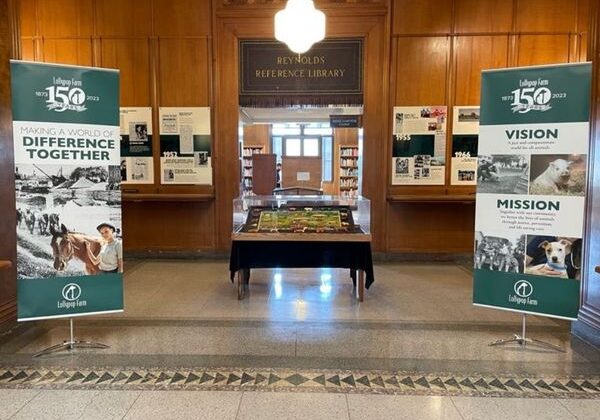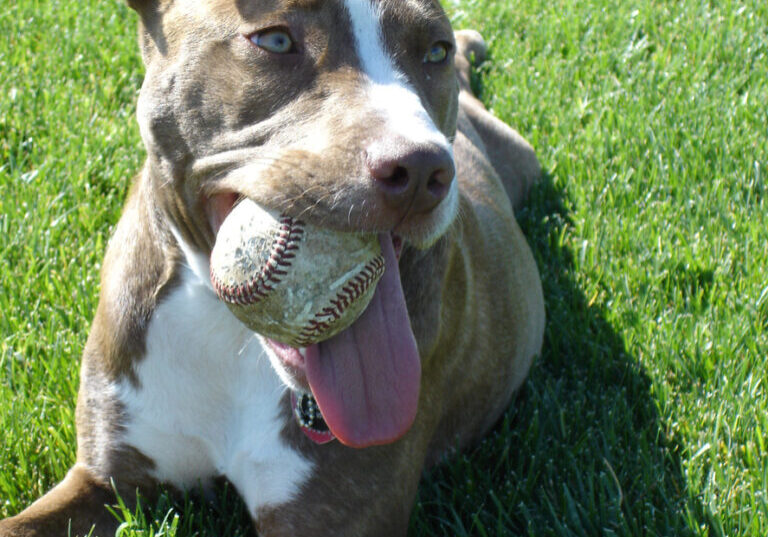








A World of Difference

Bettering the lives of animals since 1873
From Erie Canal workhorses to modern-day companions. From neglected guard dogs to beloved best friends. Since our inception in 1873, Lollypop Farm has been at the forefront of advancing the way society views our relationships with animals. As we celebrate 150 years, let’s reflect on the world of difference we’ve made—and get ready for the world of difference we will continue to make, together.
150 Years of Change
Thanks to the passion of our staff and our incredible donors, we’ve seen a lot of change in a century and a half. Check out our timeline to see how we’ve helped create a more compassionate world for animals and the Rochester community we serve.
1873
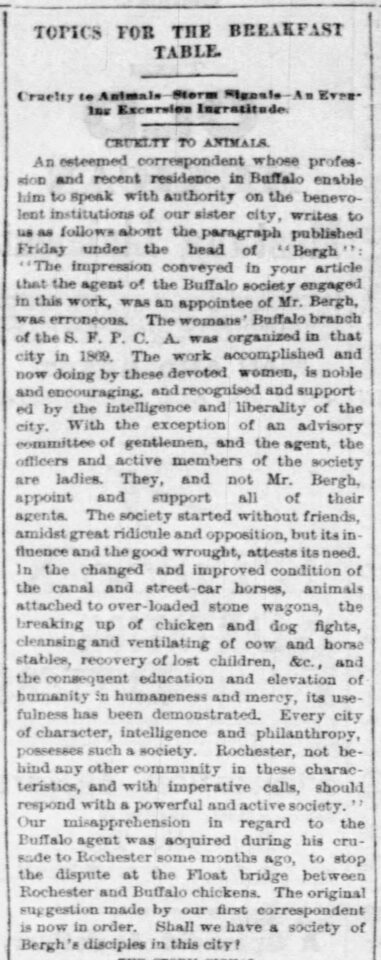
A call to action on behalf of animals
“The canal and street-car horses, animals attached to over-loaded stone wagons,
the breaking up of chicken and dog fights, cleansing and ventilating of cow and
horse stables, recovery of lost children…”
“The canal and street-car horses, animals attached to over-loaded stone wagons,
the breaking up of chicken and dog fights, cleansing and ventilating of cow and
horse stables, recovery of lost children…”
November 20, 1873

First Official Meeting of the Bergh Association of Rochester
A meeting of Citizens was held in the Common Council Chamber to organize a society for the prevention of cruelty to animals.
A meeting of Citizens was held in the Common Council Chamber to organize a society for the prevention of cruelty to animals.
January 6, 1874
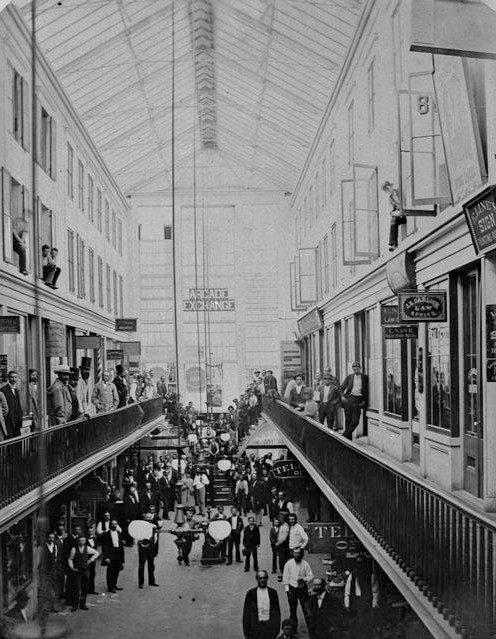
First Enforcement Officer Appointed
William H. Griffin is appointed as the first enforcement agent to act in any case of
animal cruelty. He opened the society’s first
office at number 57 in the old Reynolds Arcade.
William H. Griffin is appointed as the first enforcement agent to act in any case of
animal cruelty. He opened the society’s first
office at number 57 in the old Reynolds Arcade.
1874
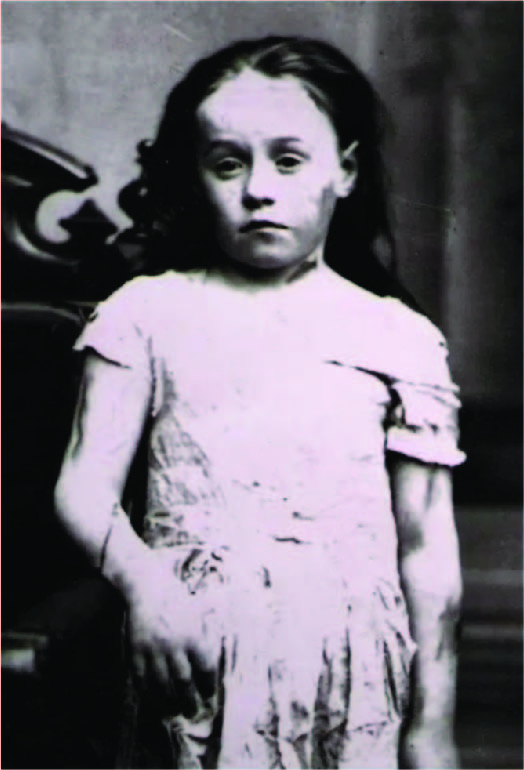
A History Protecting Children
A disturbing report of child abuse involving a girl named Mary Ellen Wilson is reported to Etta Wheeler, a social worker in NYC. At the time, there were no laws to protect children from abuse. Wheeler recruited Henry Bergh, lawyer, and founder of the ASPCA, to represent Mary Ellen.
A disturbing report of child abuse involving a girl named Mary Ellen Wilson is reported to Etta Wheeler, a social worker in NYC. At the time, there were no laws to protect children from abuse. Wheeler recruited Henry Bergh, lawyer, and founder of the ASPCA, to represent Mary Ellen.
1875
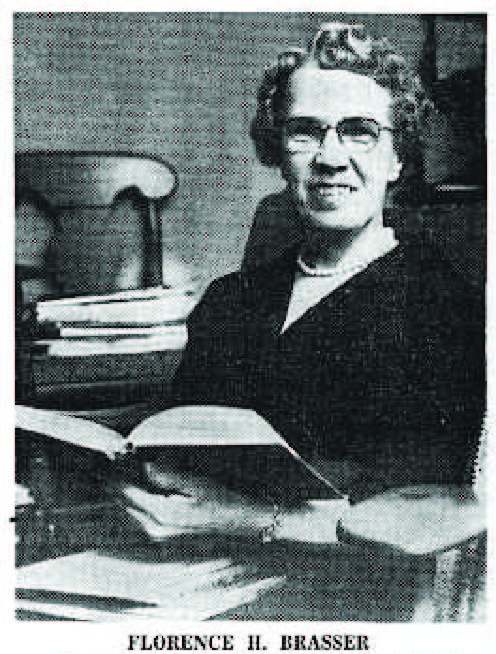
Mary Ellen Moves to Rochester
Mary Ellen moved and lived out the remainder of her life in Rochester, NY. One of Mary Ellen’s daughters, Florence Brasser, was a career schoolteacher whose outstanding work was memorialized by the Gates-Chili School District, which named a school after her.
Mary Ellen moved and lived out the remainder of her life in Rochester, NY. One of Mary Ellen’s daughters, Florence Brasser, was a career schoolteacher whose outstanding work was memorialized by the Gates-Chili School District, which named a school after her.
January 9, 1880
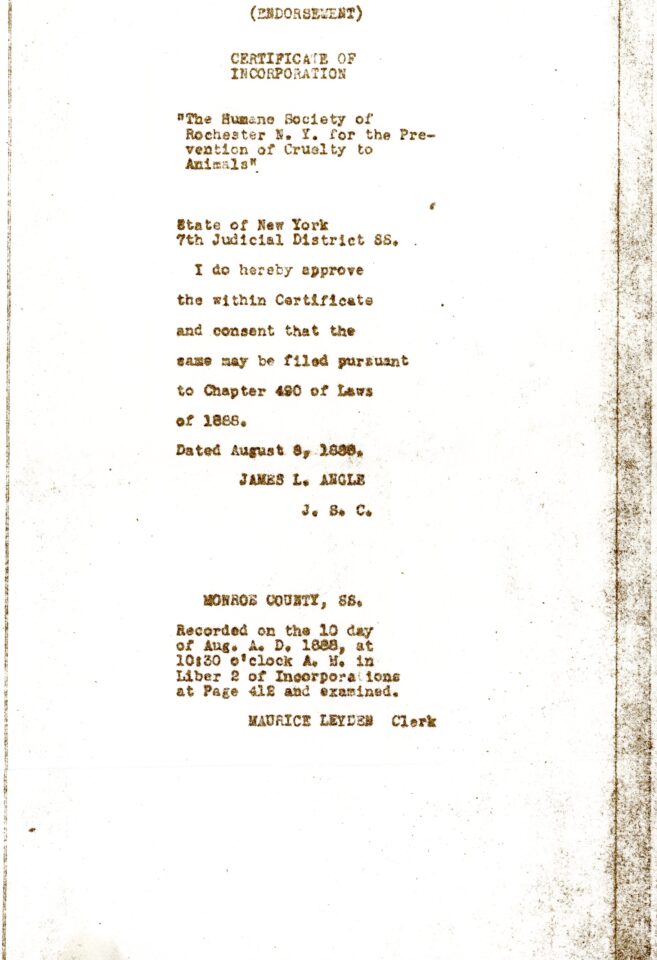
A United Front to Protect Animals and Children
The Bergh Association and the previously established Rochester Society for the Prevention of Cruelty to Children vote on a formal merger. A new name is chosen: The Humane Society of Rochester, New York for the Prevention of Cruelty to Children and Animals.
The Bergh Association and the previously established Rochester Society for the Prevention of Cruelty to Children vote on a formal merger. A new name is chosen: The Humane Society of Rochester, New York for the Prevention of Cruelty to Children and Animals.
1891

Shelter Established at 90 Sophia Street
Efforts in the late 1880s helped raise funds to obtain the Society’s first animal ambulance and a permanent shelter at 90 Sophia Street (Plymouth Avenue North). Today, this historic building is the headquarters for the Open Door Mission.
Efforts in the late 1880s helped raise funds to obtain the Society’s first animal ambulance and a permanent shelter at 90 Sophia Street (Plymouth Avenue North). Today, this historic building is the headquarters for the Open Door Mission.
1891
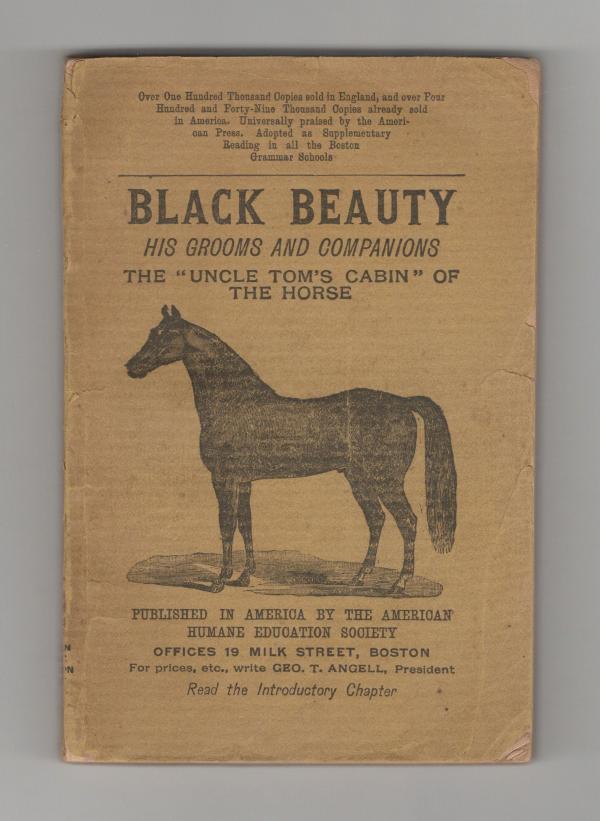
Black Beauty used for Humane Education
February 3, 1897
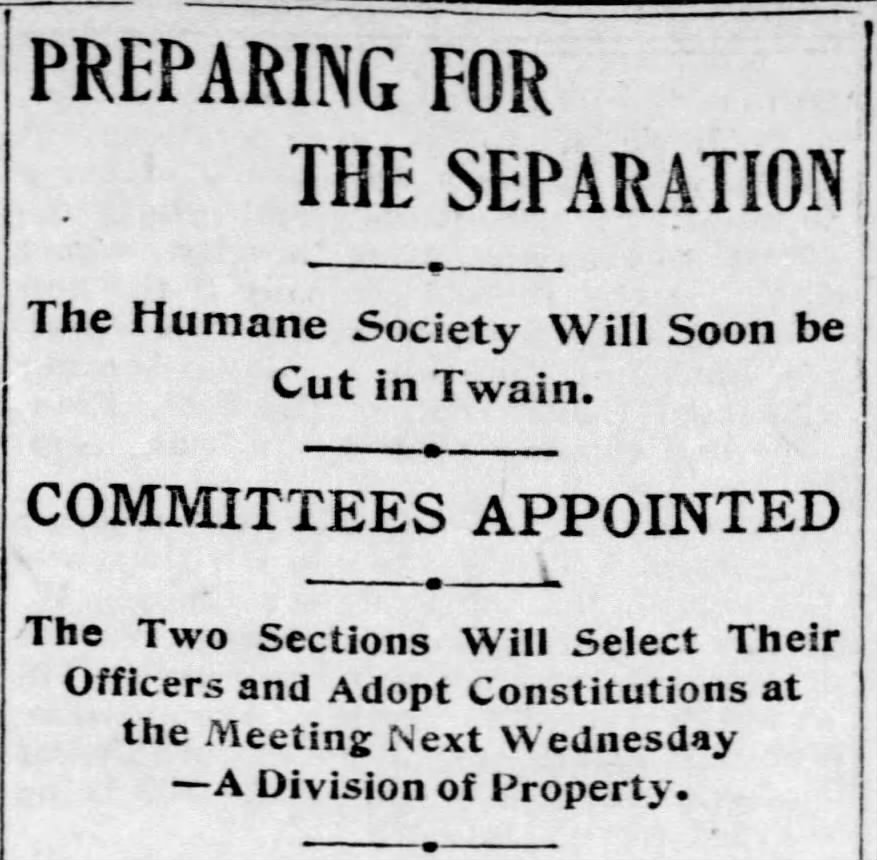
De-merger and Focus on Saving Animals
With the growing demand for services, limited bandwidth, and ultimately friction over an expanding mission, the two halves of the Humane Society agree on a de-merger. This created two independent organizations:
- The Humane Society of Rochester for the Prevention of Cruelty to Animals
- The Society for The Prevention of Cruelty to Children
With the growing demand for services, limited bandwidth, and ultimately friction over an expanding mission, the two halves of the Humane Society agree on a de-merger. This created two independent organizations:
- The Humane Society of Rochester for the Prevention of Cruelty to Animals
- The Society for The Prevention of Cruelty to Children
1899
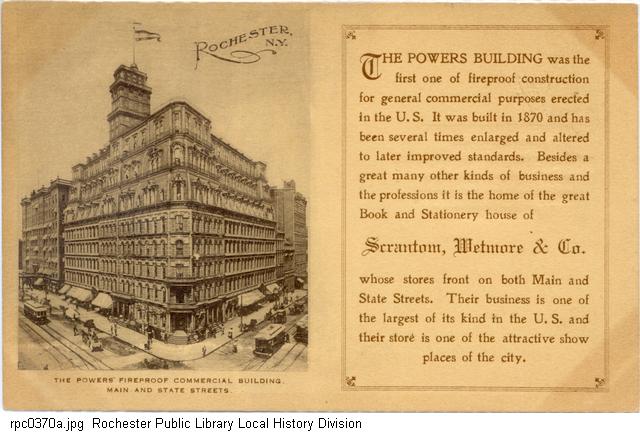
New Headquarters Founded
Moved to a new location at 723 Powers Building.
Moved to a new location at 723 Powers Building.
1900s

New focus on Humane Education
New programs to educate children in school on the care of animals begin including a Junior Membership Program.
New programs to educate children in school on the care of animals begin including a Junior Membership Program.
1910

Early Aid for Equine
The Humane Society focused many of its early efforts on preventing and seeking justice for work horses and cattle.
The Humane Society focused many of its early efforts on preventing and seeking justice for work horses and cattle.
1910
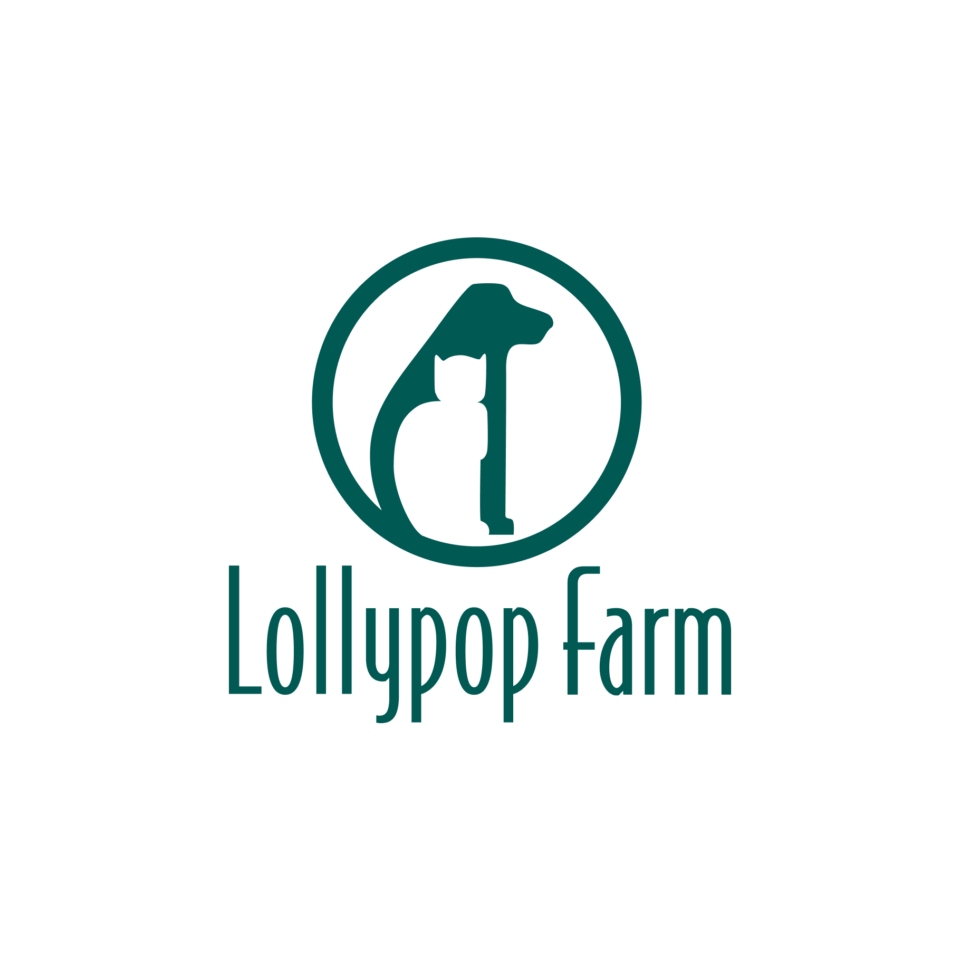
New Location on St. Paul
The Humane Society acquired new facilities at 103 St. Paul Street.
The Humane Society acquired new facilities at 103 St. Paul Street.
1919
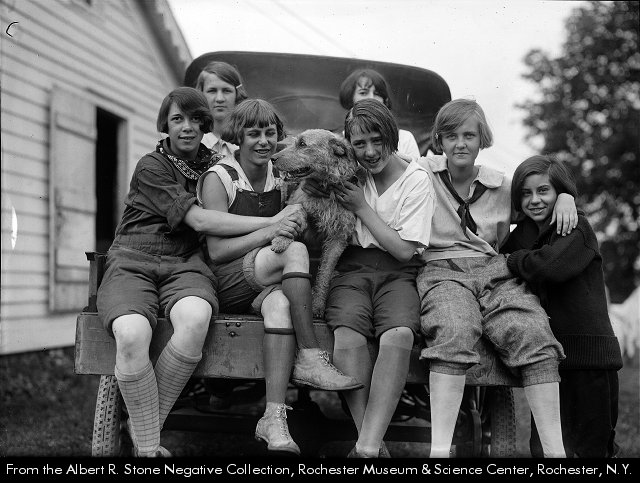
Be Kind To Animals Week at Genesee Valley Park
1922
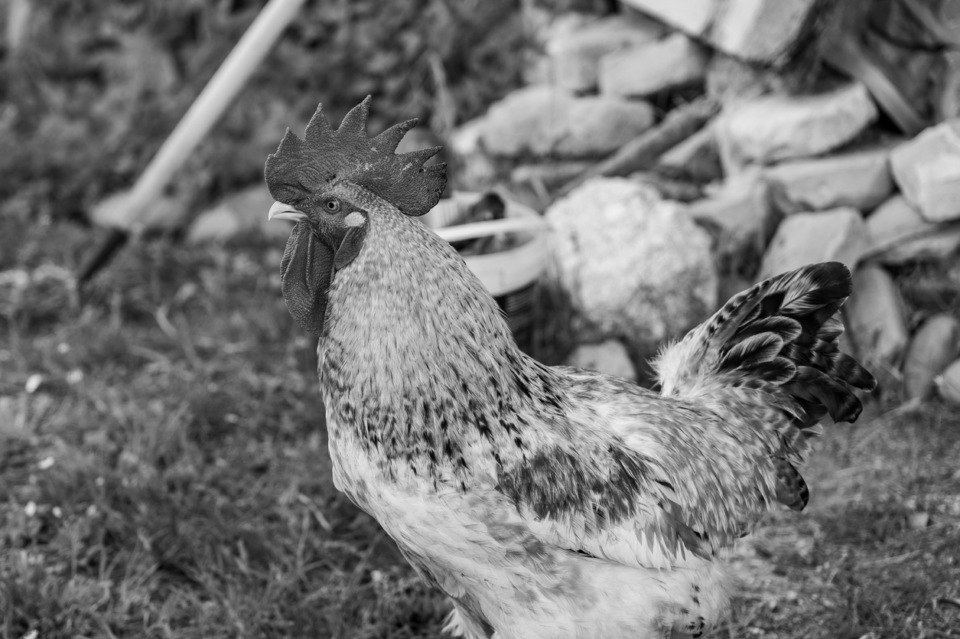
Humane Society Seeks Justice Against Cock Fighting
Humane Society officers seek justice for roosters used in cock fighting and seize them from the inhumane conditions in which they are kept.
Humane Society officers seek justice for roosters used in cock fighting and seize them from the inhumane conditions in which they are kept.
1927
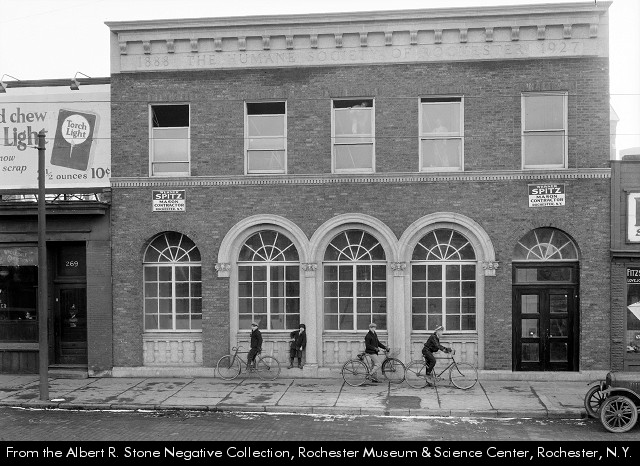
New Location on Central Avenue
The Humane Society moves to new location at 263 Central Avenue.
The Humane Society moves to new location at 263 Central Avenue.
1927
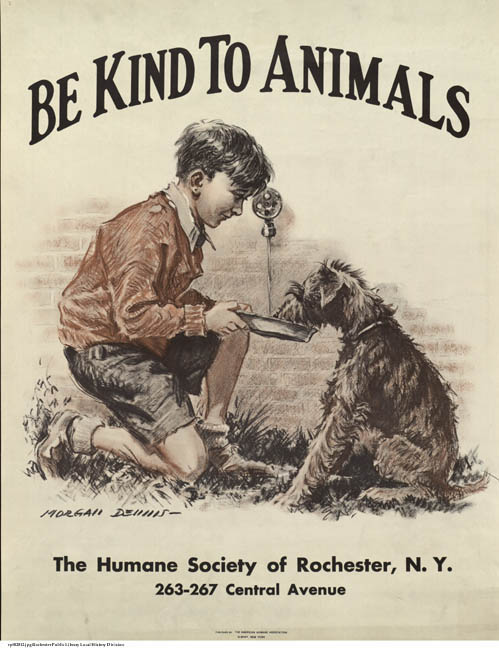
Be Kind to Animals Week
1942
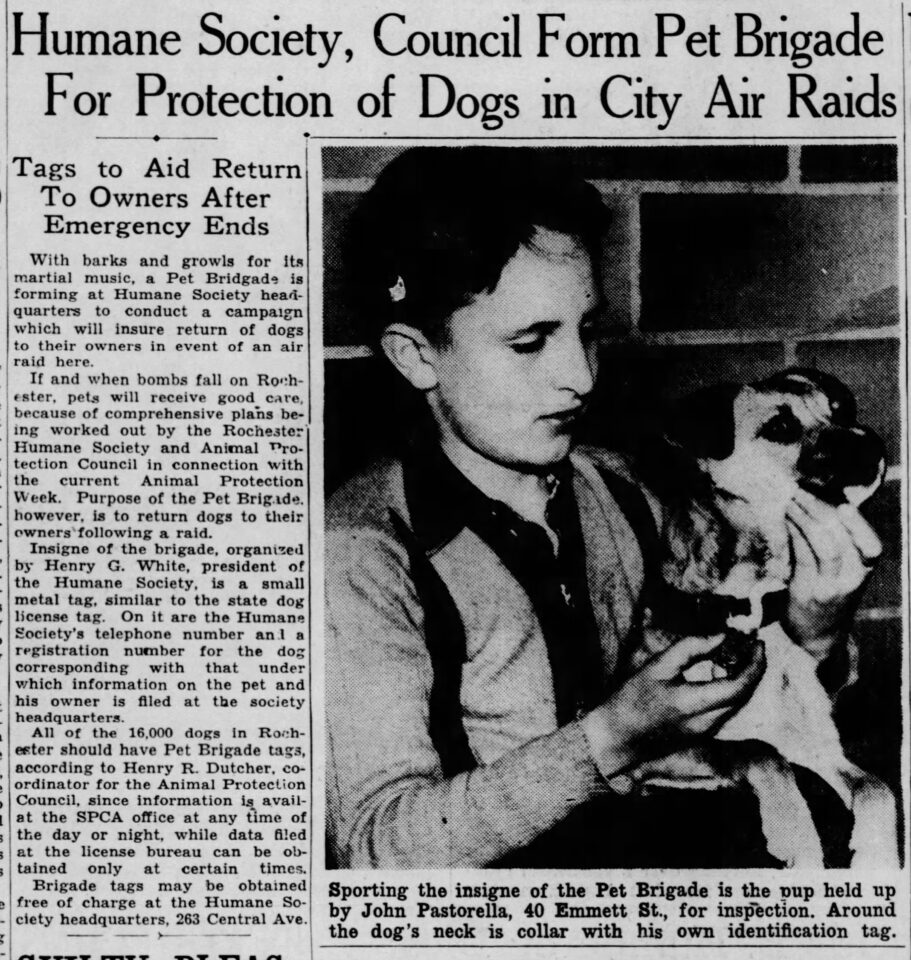
Pet Brigade Formed
As part of efforts by the Humane Society the Animal Defense Council and Pet Brigade were established. These efforts included tagging pets to ensure they could be returned to their owners in case of air raid during the war.
As part of efforts by the Humane Society the Animal Defense Council and Pet Brigade were established. These efforts included tagging pets to ensure they could be returned to their owners in case of air raid during the war.
1942
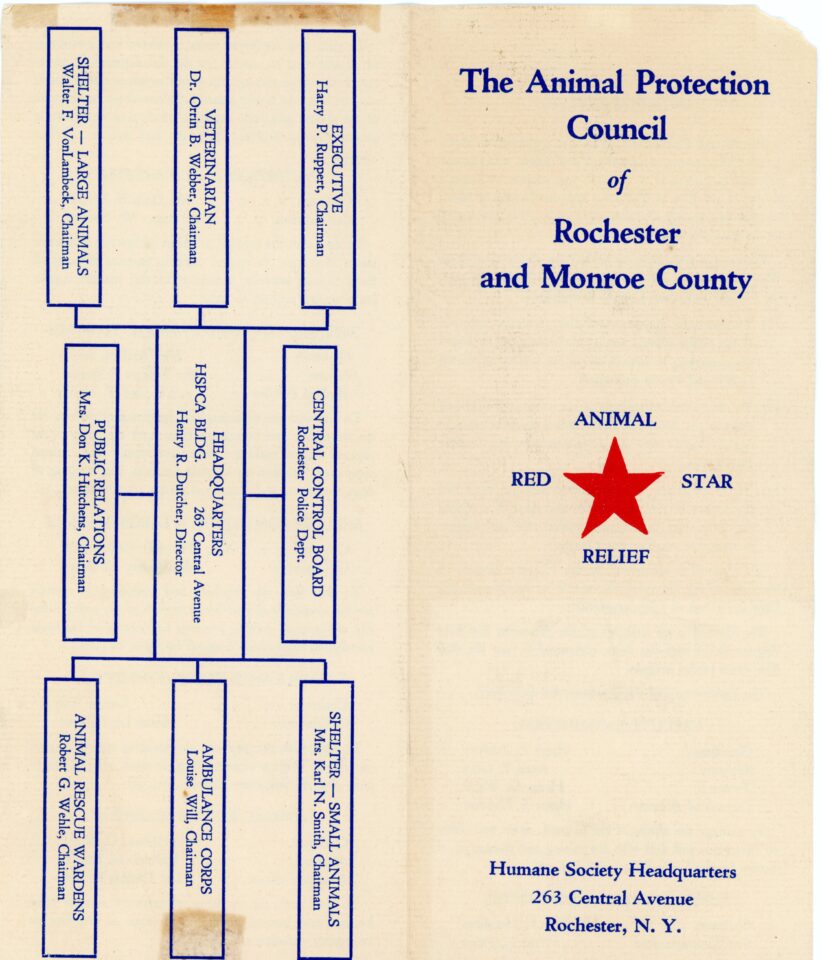
Animal Protection Council of Rochester and Monroe County created
March 11, 1952
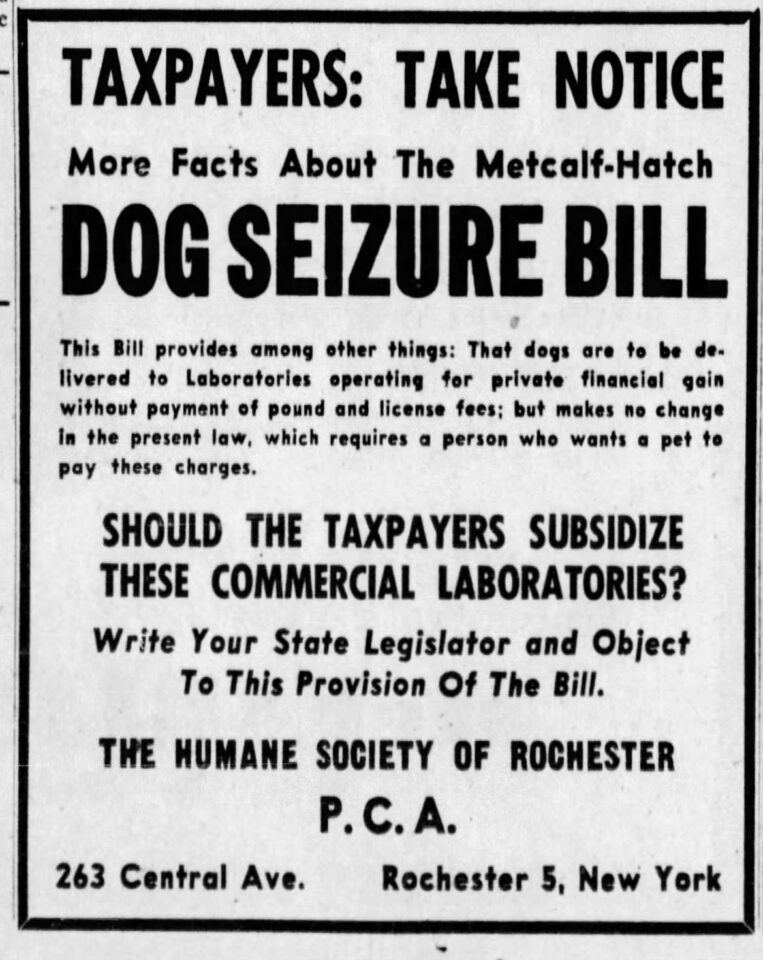
Hatch-Metcalf Bill signed into law
The Humane Society opposed the passage of the Hatch-Metcalf animals-for-research law under which unlicensed, unwanted, stray dogs must be surrendered for medical research.
The Humane Society opposed the passage of the Hatch-Metcalf animals-for-research law under which unlicensed, unwanted, stray dogs must be surrendered for medical research.
1952
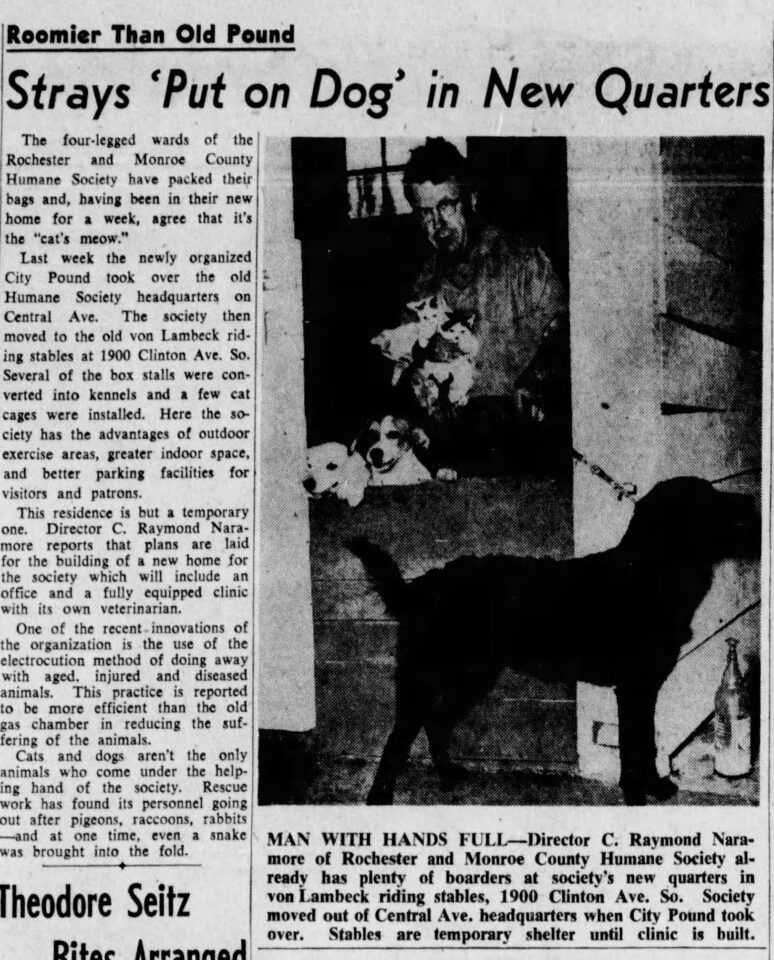
Humane Society Relinquishes Status as Animal Control Agency After Opposing Hatch-Metcalf Animals-for-Research Law
As a result, the Humane Society got out of the dog-pound business and continued to operate as an animal adoption service. The shelter opened a temporary residence at 1900 South Clinton Avenue.
As a result, the Humane Society got out of the dog-pound business and continued to operate as an animal adoption service. The shelter opened a temporary residence at 1900 South Clinton Avenue.
July 7, 1952
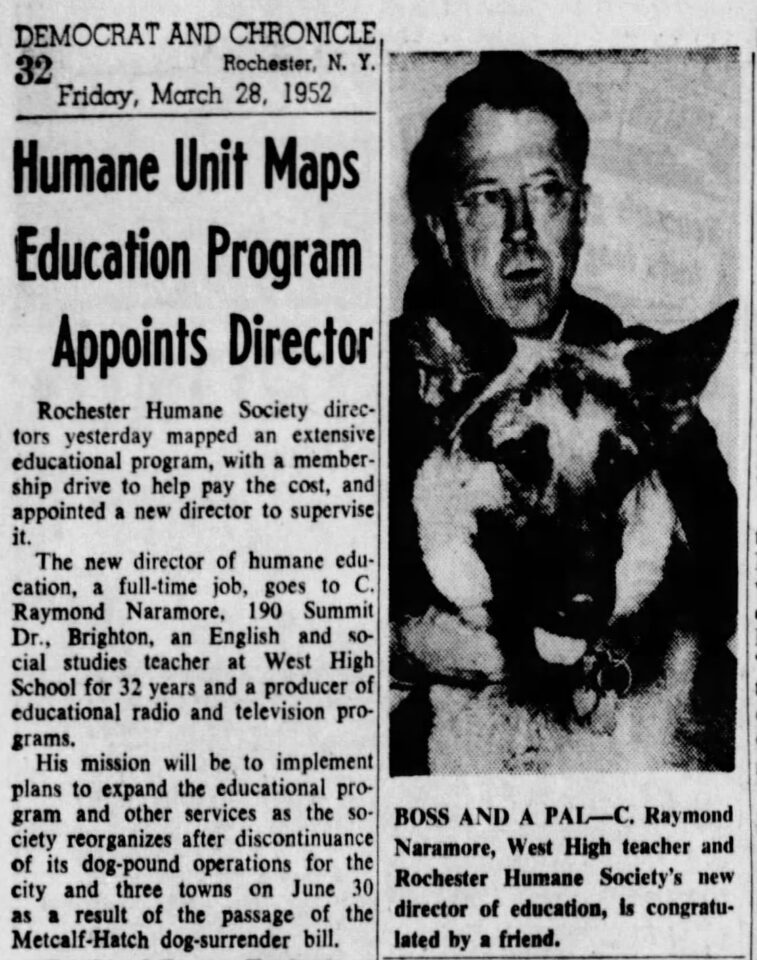
Humane Society Director Ray Naramore Places New Emphasis on Humane Education
During the 1950s Humane Society director Ray Naramore, a former teacher, placed great emphasis on building our organization’s humane education programs. Naramore believed that the best and most efficient means of promoting kindness and pet owner responsibility was to make learning about animals fun.
During the 1950s Humane Society director Ray Naramore, a former teacher, placed great emphasis on building our organization’s humane education programs. Naramore believed that the best and most efficient means of promoting kindness and pet owner responsibility was to make learning about animals fun.
May 1955
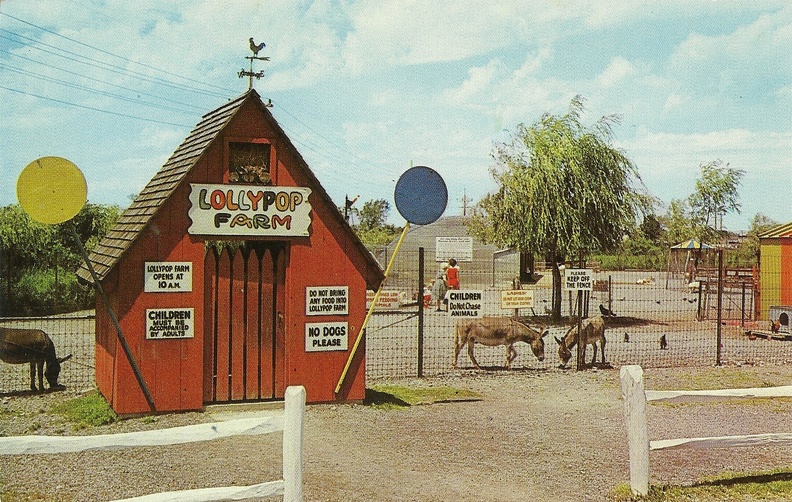
Humane Society Moves to West Henrietta Location
Former teacher Raymond C. Naramore led the society for seventeen years through a period of tremendous change marked by the establishment of Lollypop Farm on West Henrietta Road using a renovated apartment house on seven acres across from what is now Marketplace Mall. The Lollypop Farm petting zoo and adjoining animal shelter marked a starting point for Naramore’s vision of an organization devoted to promoting humane education and kindness to all creatures.
Former teacher Raymond C. Naramore led the society for seventeen years through a period of tremendous change marked by the establishment of Lollypop Farm on West Henrietta Road using a renovated apartment house on seven acres across from what is now Marketplace Mall. The Lollypop Farm petting zoo and adjoining animal shelter marked a starting point for Naramore’s vision of an organization devoted to promoting humane education and kindness to all creatures.
April 12, 1960
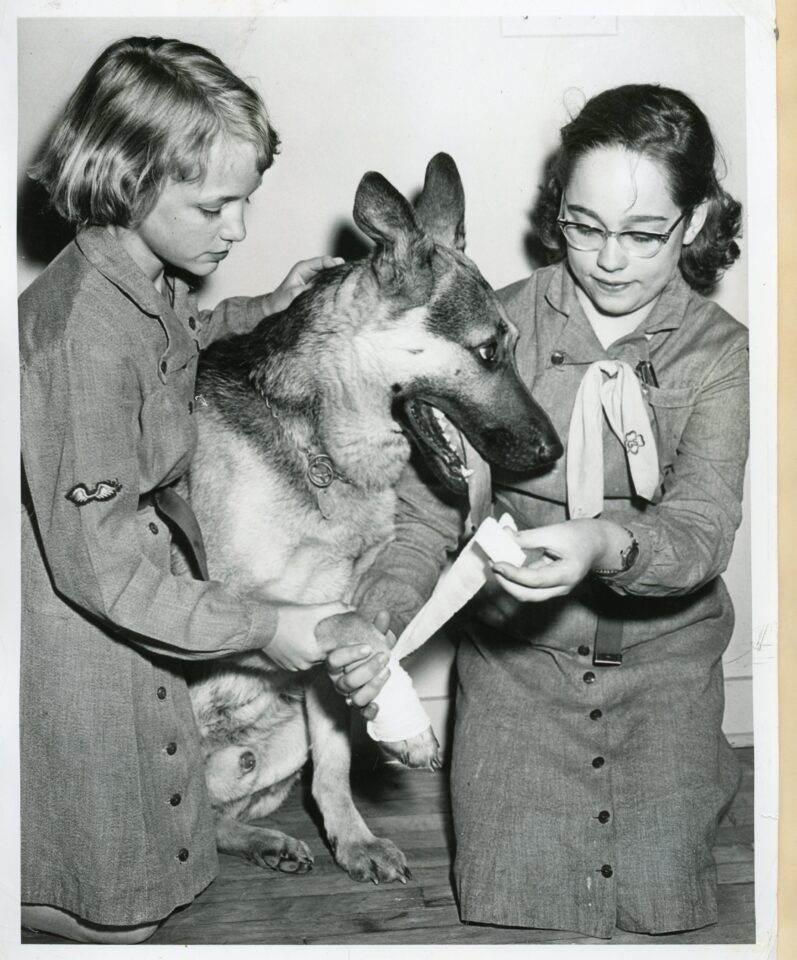
Scouting Programs Start at Lollypop Farm
Scout merit badge classes begin under the instruction of Carolyn Ahern.
Scout merit badge classes begin under the instruction of Carolyn Ahern.
1960
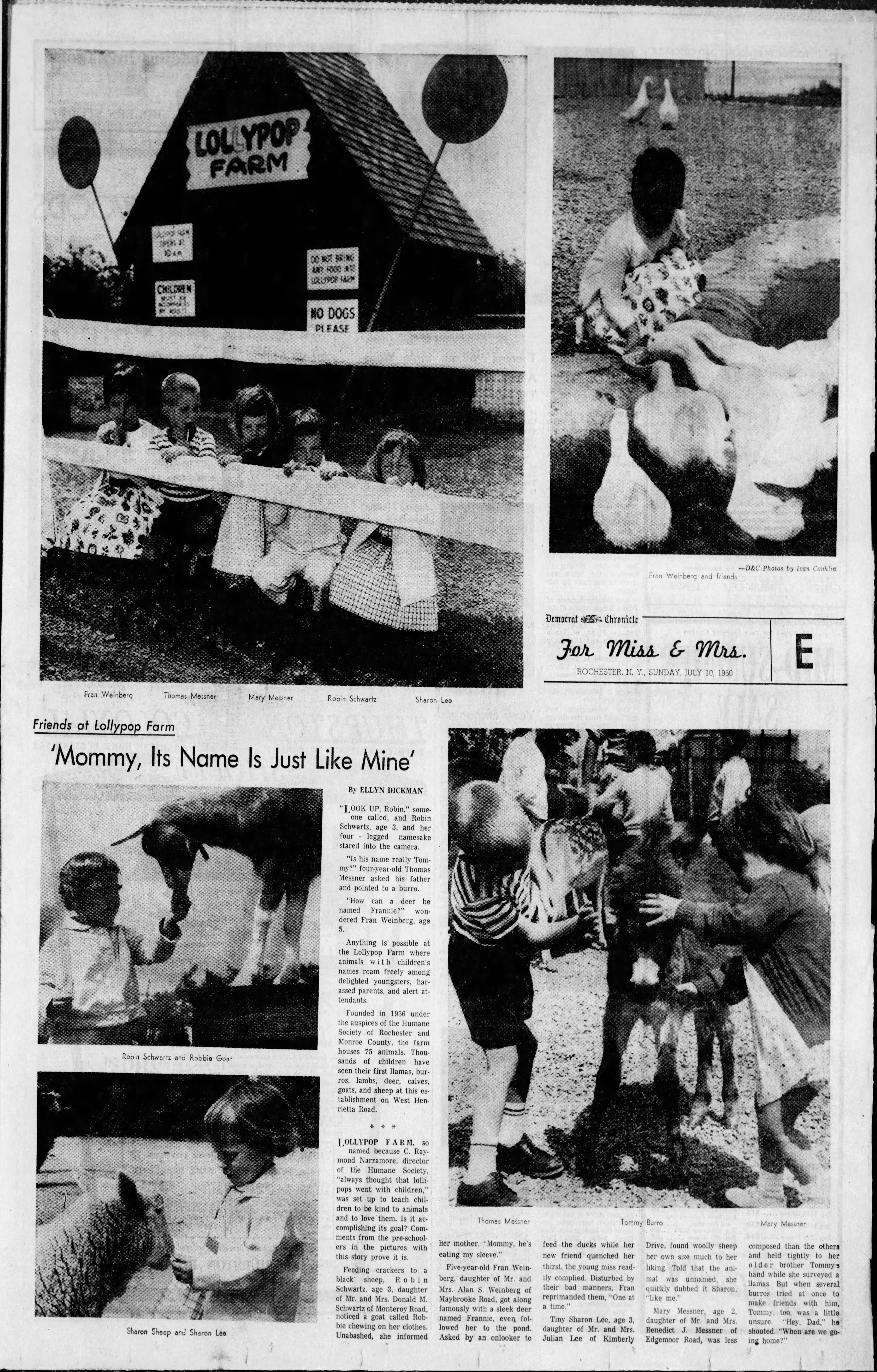
Lollypop News
Naramore was a regular contributor to the Democrat & Chronicle, keeping humane treatment of animals top of mind for the public.
Naramore was a regular contributor to the Democrat & Chronicle, keeping humane treatment of animals top of mind for the public.
1963
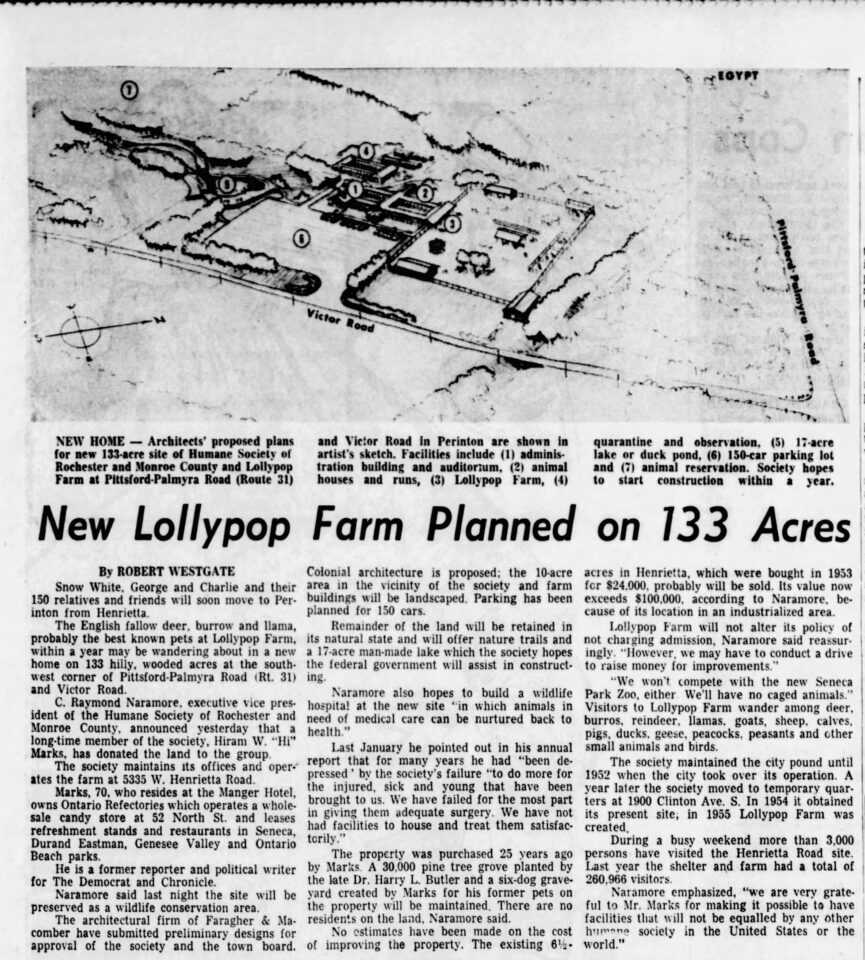
Land in Perinton Donated to Lollypop Farm
Mr. Hiram Marks, a Rochester businessman, donates 140 acres of land in Perinton, N.Y. to the Humane Society.
Mr. Hiram Marks, a Rochester businessman, donates 140 acres of land in Perinton, N.Y. to the Humane Society.
April 1966
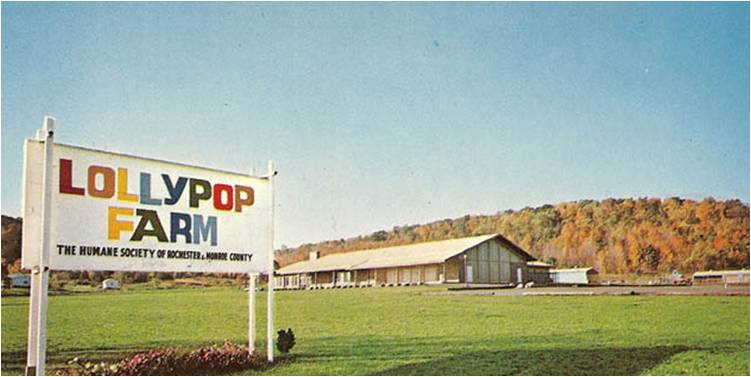
Lollypop Farm Officially Moves to Perinton
The Henrietta facility is closed in April 1966 and a new animal shelter opens in Perinton. It’s current location.
The Henrietta facility is closed in April 1966 and a new animal shelter opens in Perinton. It’s current location.
1966
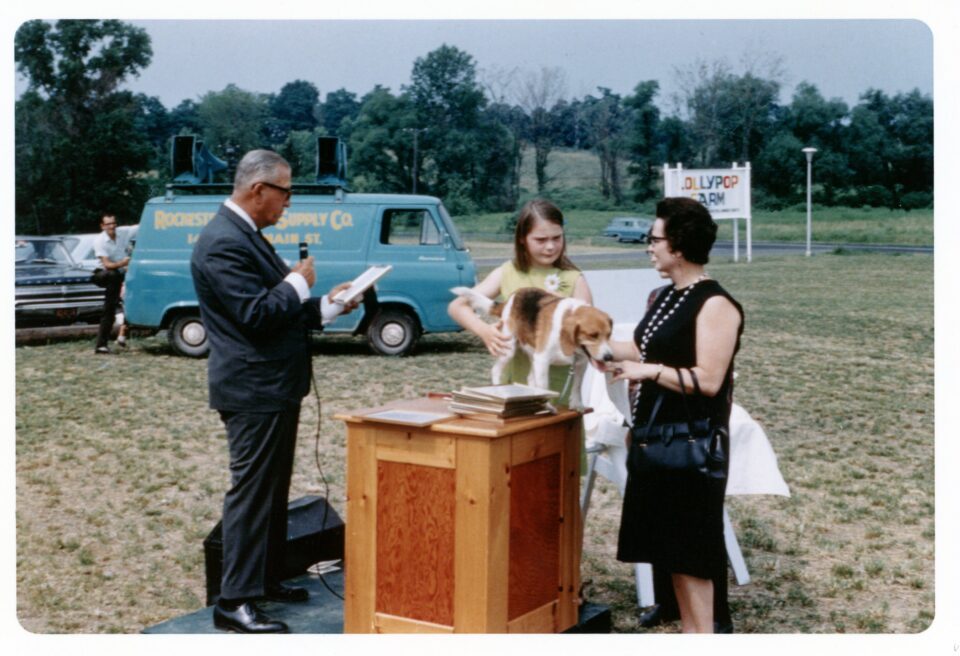
Spay and Neuter for Adoptable Pets
Under the direction of Frank M. Rogers a new policy requiring the spay and neuter of all dogs and cats for adoption in put in place to address animal population control. This policy is still in place today.
Under the direction of Frank M. Rogers a new policy requiring the spay and neuter of all dogs and cats for adoption in put in place to address animal population control. This policy is still in place today.
1968
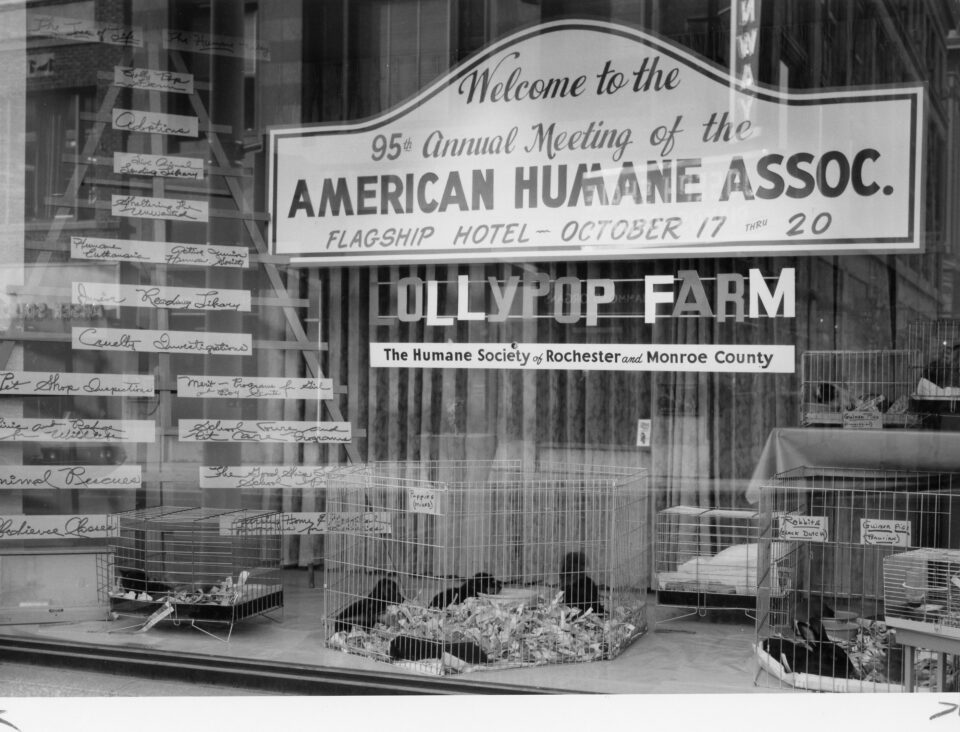
95th Annual Meeting
1972
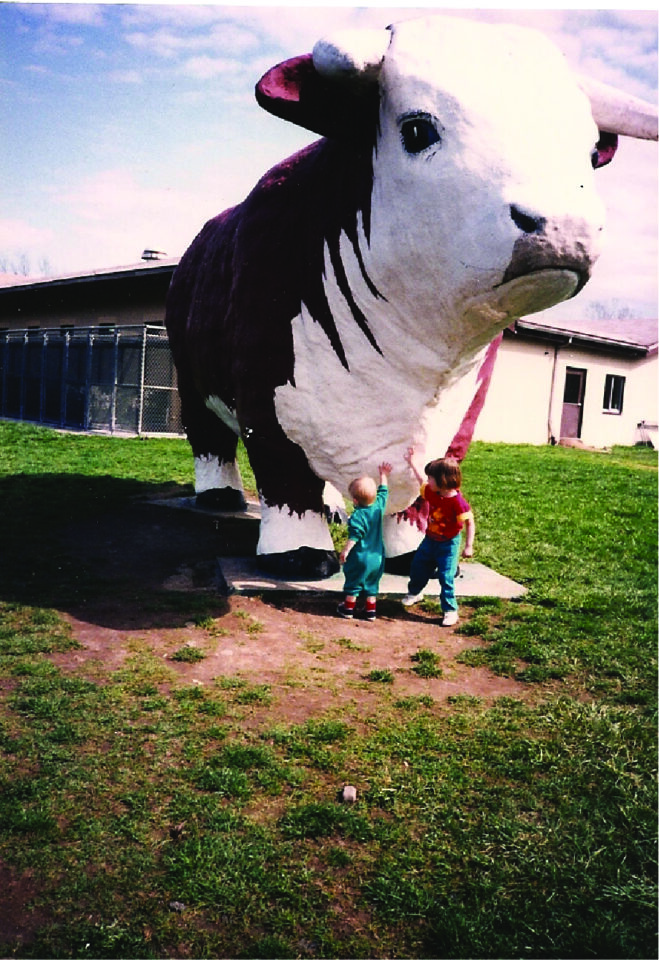
Elmer Comes to Lollypop Farm
The DeBurrs Wholesale Meat Company donates a Plaster of Paris bull to Lollypop Farm. Lovingly named Elmer, the bull resides on the farmyard today and remains a landmark and photo-op for friends and family visiting the farm.
The DeBurrs Wholesale Meat Company donates a Plaster of Paris bull to Lollypop Farm. Lovingly named Elmer, the bull resides on the farmyard today and remains a landmark and photo-op for friends and family visiting the farm.
1974
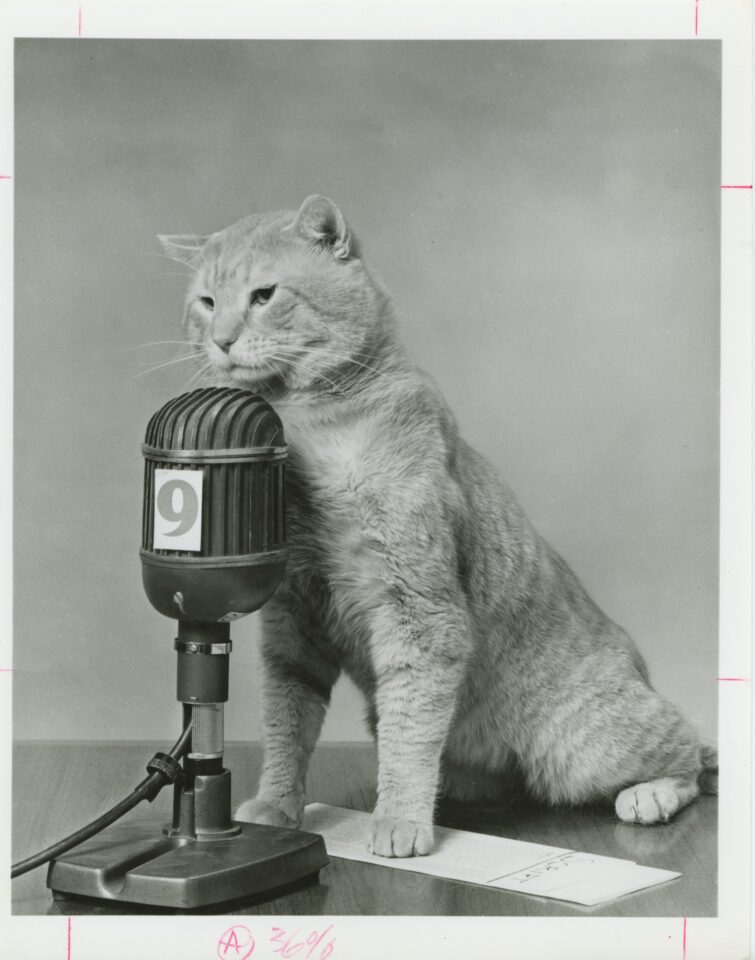
Low cost Spay/Neuter Efforts Begin
Monroe County Veterinarians and The Humane Society embark on a campaign to offer low cost spay/neuter assistance for cats and dogs.
Monroe County Veterinarians and The Humane Society embark on a campaign to offer low cost spay/neuter assistance for cats and dogs.
1980
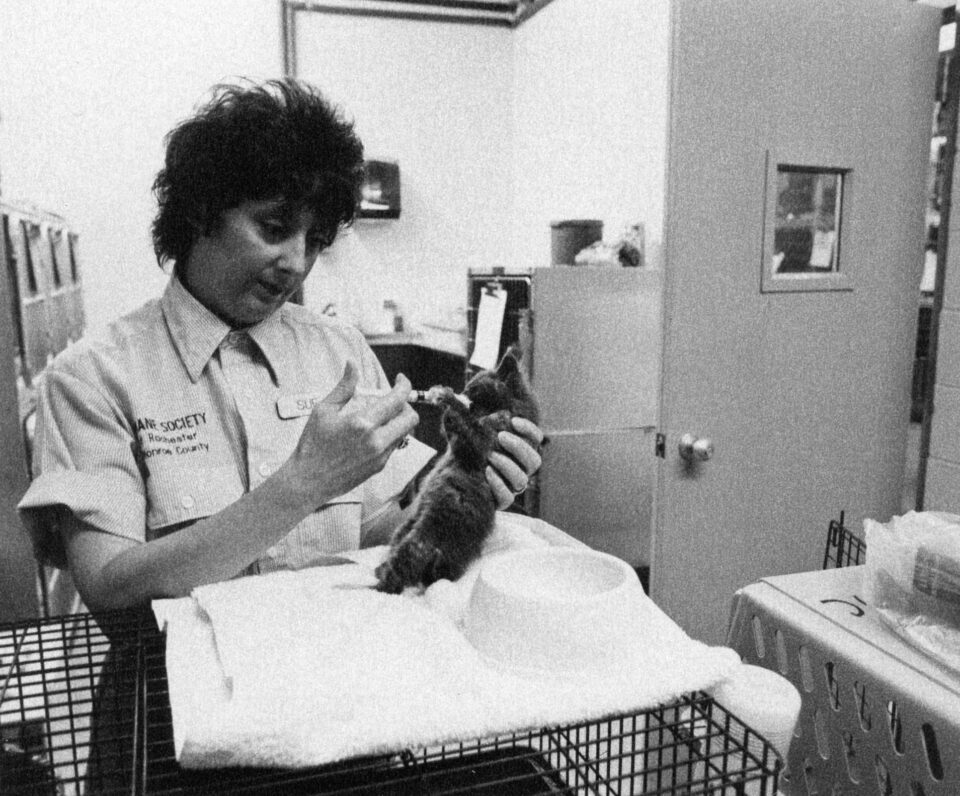
Hatch-Metcalf Act is Repealed
Hatch-Metcalf Act is repealed and the Humane Society of Rochester resumes control of Rochester Animal Services through 2000.
Hatch-Metcalf Act is repealed and the Humane Society of Rochester resumes control of Rochester Animal Services through 2000.
1986
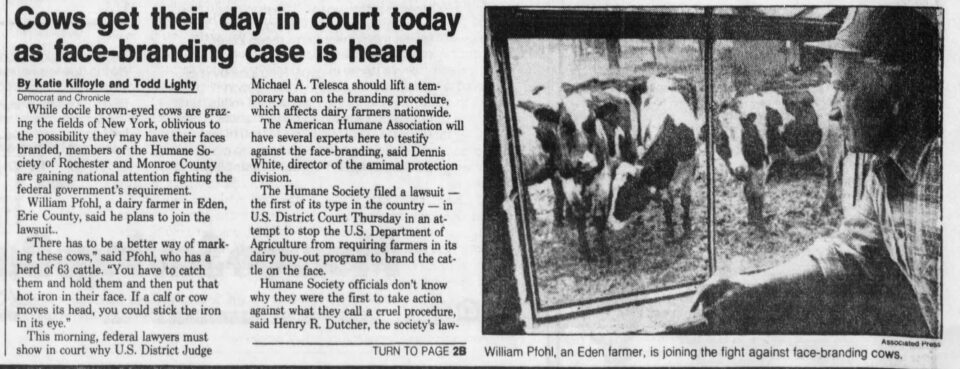
Lollypop Farm Challenges Federal Law on Hot Iron Branding of Cattle
Lollypop Farm filed a lawsuit against the USDA to discontinue the requirement that cattle are branded on their face with a hot iron, as part of the USDA dairy buyout program. The Humane Society of Rochester argued that the practice is “barbarous” and in violation of laws against cruelty to animals, and US District Judge Michael A. Telesca agreed. His ruling stopped the requirement of hot face branding, ended the federal buyout program, and prompted future legislative change on behalf of animals.
Lollypop Farm filed a lawsuit against the USDA to discontinue the requirement that cattle are branded on their face with a hot iron, as part of the USDA dairy buyout program. The Humane Society of Rochester argued that the practice is “barbarous” and in violation of laws against cruelty to animals, and US District Judge Michael A. Telesca agreed. His ruling stopped the requirement of hot face branding, ended the federal buyout program, and prompted future legislative change on behalf of animals.
1997
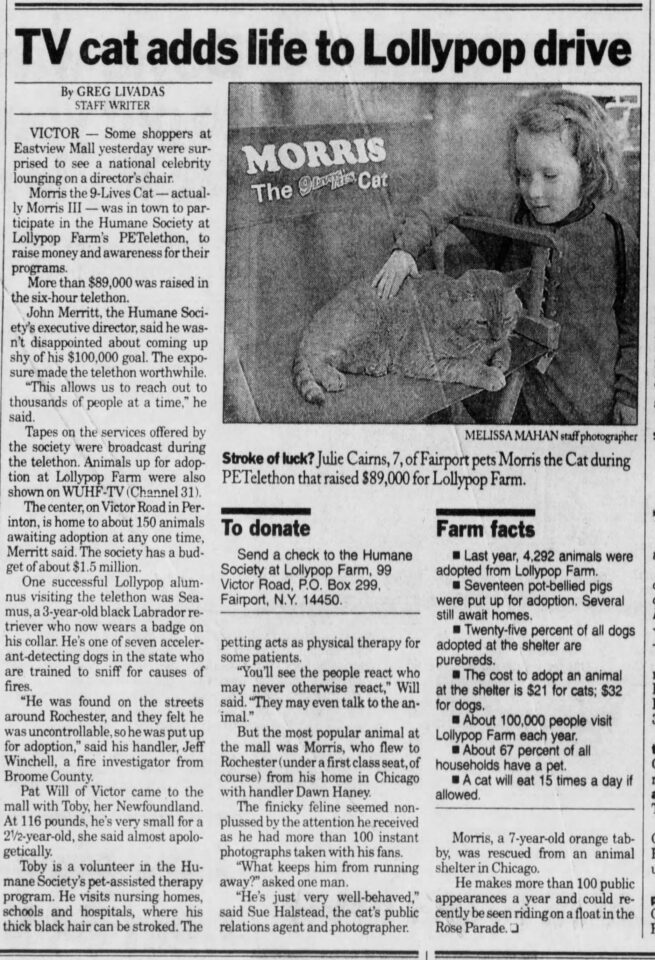
First Tails of Hope Telethon Aired
The first Tails of Hope Telethon is broadcasted live showcasing stories from the shelter and programs in the community. Currently aired on 13WHAM this is the largest annual fundraiser to help pets in the Rochester community.
The first Tails of Hope Telethon is broadcasted live showcasing stories from the shelter and programs in the community. Currently aired on 13WHAM this is the largest annual fundraiser to help pets in the Rochester community.
1999

Lollypop Farm West Opens
2000

The Anti-Animal Fighting Task Force of Monroe County launches
2000
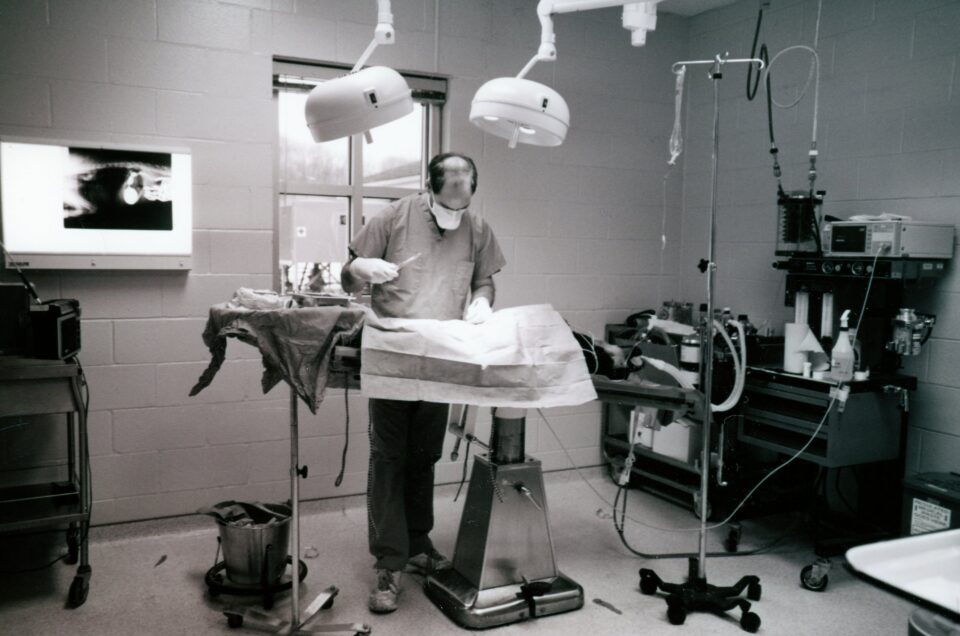
Lollypop Farm Expands to Include Surgery Clinic
Lollypop Farm dedicates new, state-of-the-art animal care facility in Fairport with a surgery clinic, climate-controlled barn, and extensive education facilities.
Lollypop Farm dedicates new, state-of-the-art animal care facility in Fairport with a surgery clinic, climate-controlled barn, and extensive education facilities.
2000
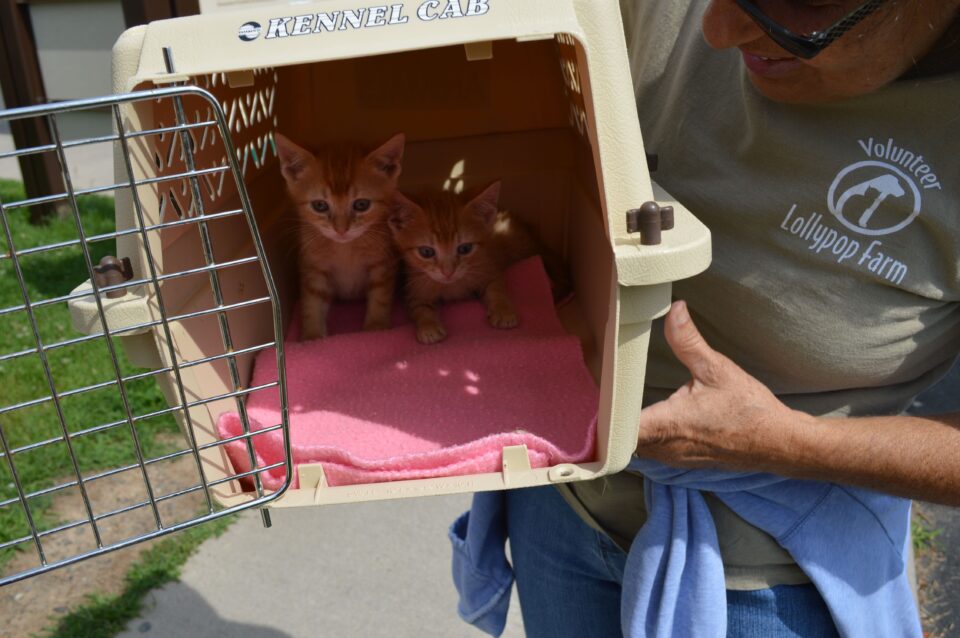
Launches Foster care department
September 1, 2001
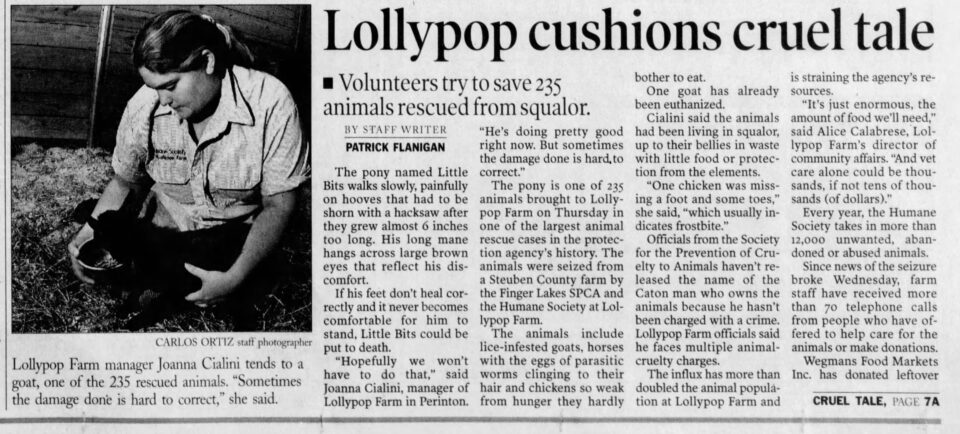
Gilfus Case in Port Byron, NY
Lollypop Farm confiscates 321 animals from the Gilfus Farm’s petting zoo in Port Byron. Having found the animals under severe neglect, this was the beginning of a yearlong cruelty case ending with the conviction of four members of the Gilfus family. Lollypop Farm had spent $750,000 in veterinary and daily animal care before the end of the case allowing them to find new homes for the animals.
Lollypop Farm confiscates 321 animals from the Gilfus Farm’s petting zoo in Port Byron. Having found the animals under severe neglect, this was the beginning of a yearlong cruelty case ending with the conviction of four members of the Gilfus family. Lollypop Farm had spent $750,000 in veterinary and daily animal care before the end of the case allowing them to find new homes for the animals.
September 2003
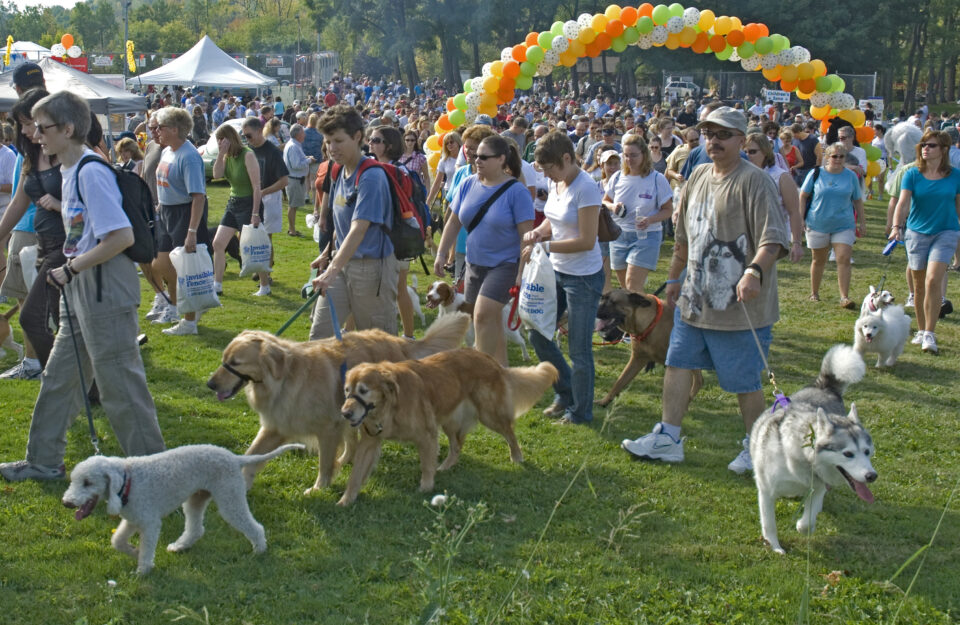
First Annual Barktober Fest Held
The Walk for the Animals at Barktober Fest is the largest pet-friendly festival to help animals in the Rochester community. First held in 2003, the event now raises enough money to help thousands of animals every year.
The Walk for the Animals at Barktober Fest is the largest pet-friendly festival to help animals in the Rochester community. First held in 2003, the event now raises enough money to help thousands of animals every year.
2005
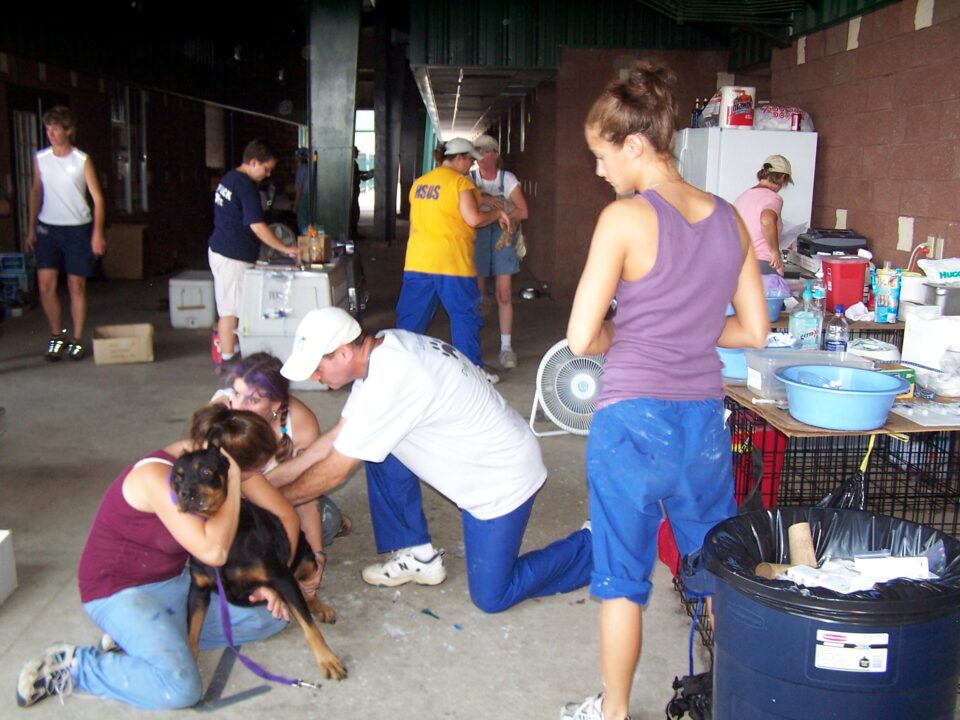
Lollypop Farm Aids Hurricane Katrina Relief
The organization sent staff and volunteers to Louisiana to help the 700 animals displaced by Hurricane Katrina.
The organization sent staff and volunteers to Louisiana to help the 700 animals displaced by Hurricane Katrina.
2008
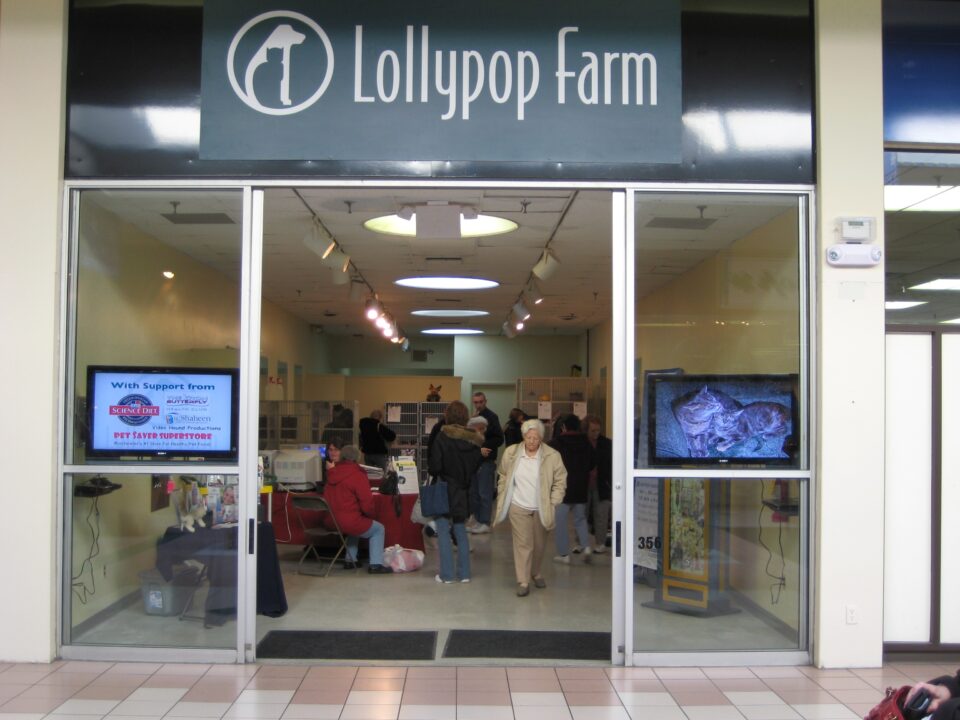
Lollypop Farm West Closes & Opens Adoption Location in Mall at Greece Ridge
In an effort to provide the west side of Rochester a convenient option for adoption, a satellite adoption location is opened at the Mall at Greece Ridge.
In an effort to provide the west side of Rochester a convenient option for adoption, a satellite adoption location is opened at the Mall at Greece Ridge.
2015
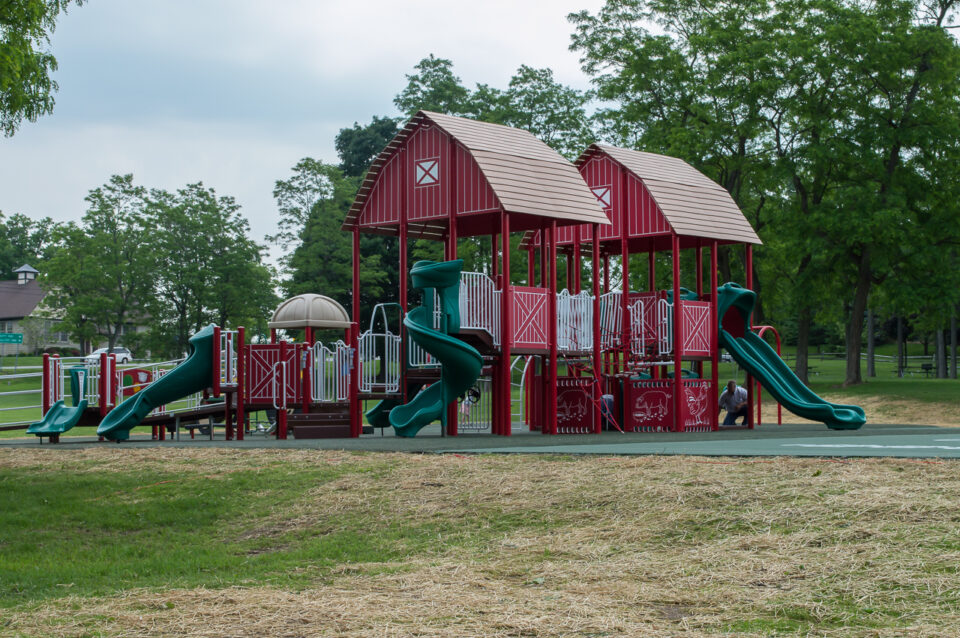
Ribbon Cutting at Egypt Park
2017
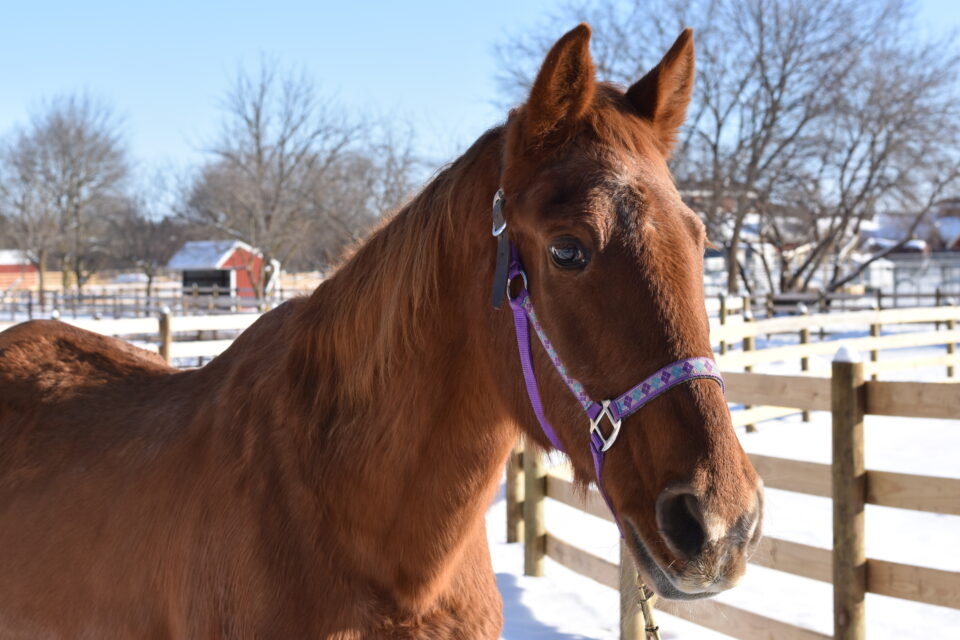
Launch of the Wanda Polisseni Equine Adoption Program and Evelyn Z. Diehl Equine Training & Rehabilitation Center
June 19, 2019
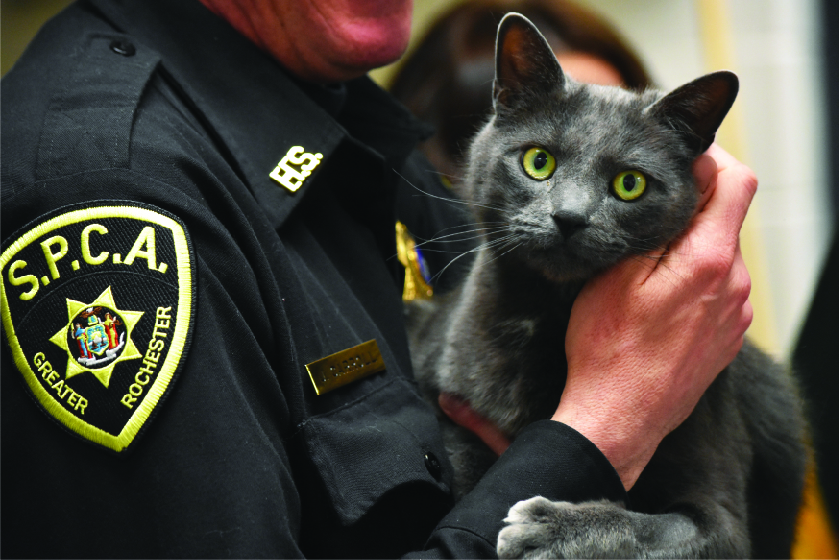
Launches Animal Crime Intervention Program
The Animal Crimes Intervention Program is a three-month psychoeducational learning course designed for those convicted of animal crimes to learn accountability and understand prior motivations around animal abuse or neglect. Ultimately, the program’s goal is to make communities safer for animals and people.
The Animal Crimes Intervention Program is a three-month psychoeducational learning course designed for those convicted of animal crimes to learn accountability and understand prior motivations around animal abuse or neglect. Ultimately, the program’s goal is to make communities safer for animals and people.
March 2020
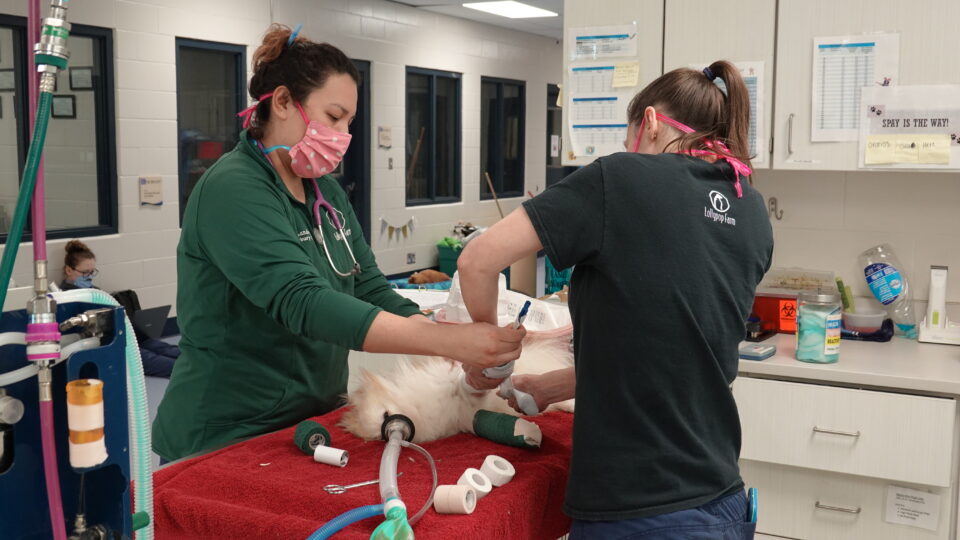
Lollypop Farm Remains Open Through COVID Pandemic
Lollypop Farm remained open to the public providing vital services like adoptions, virtual education programs, animal care, and humane law enforcement.
Lollypop Farm remained open to the public providing vital services like adoptions, virtual education programs, animal care, and humane law enforcement.
February 2021
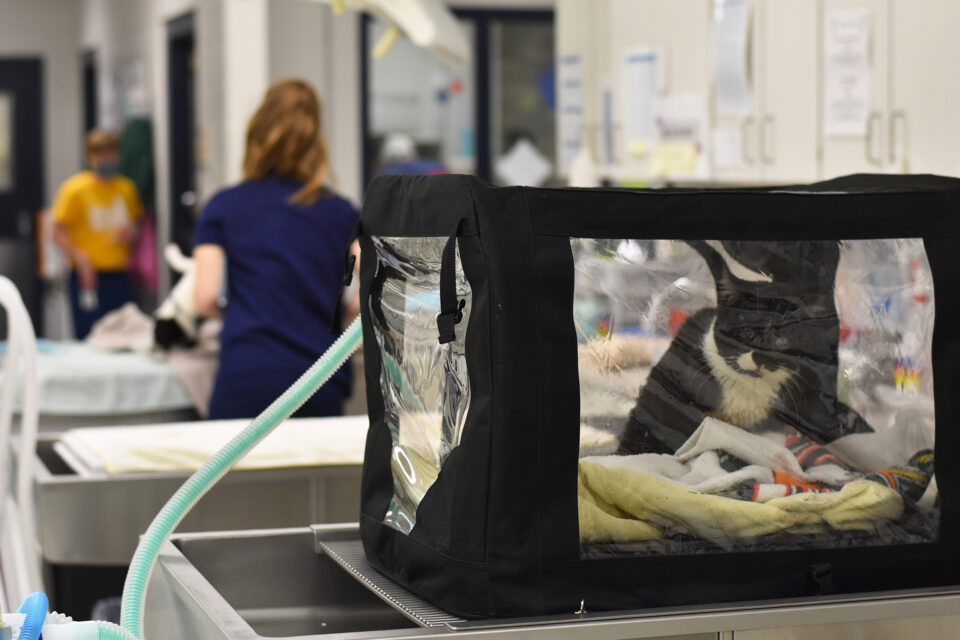
Lifesaving care provided to 100 Cats involved in house fire
Lollypop Farm Humane Law Enforcement and shelter staff come to the aid of firefighters when over 100 cats are discovered during a house fire in Perinton. The shelter took in the cats providing care and aiding in finding them new homes.
Lollypop Farm Humane Law Enforcement and shelter staff come to the aid of firefighters when over 100 cats are discovered during a house fire in Perinton. The shelter took in the cats providing care and aiding in finding them new homes.
January 2022
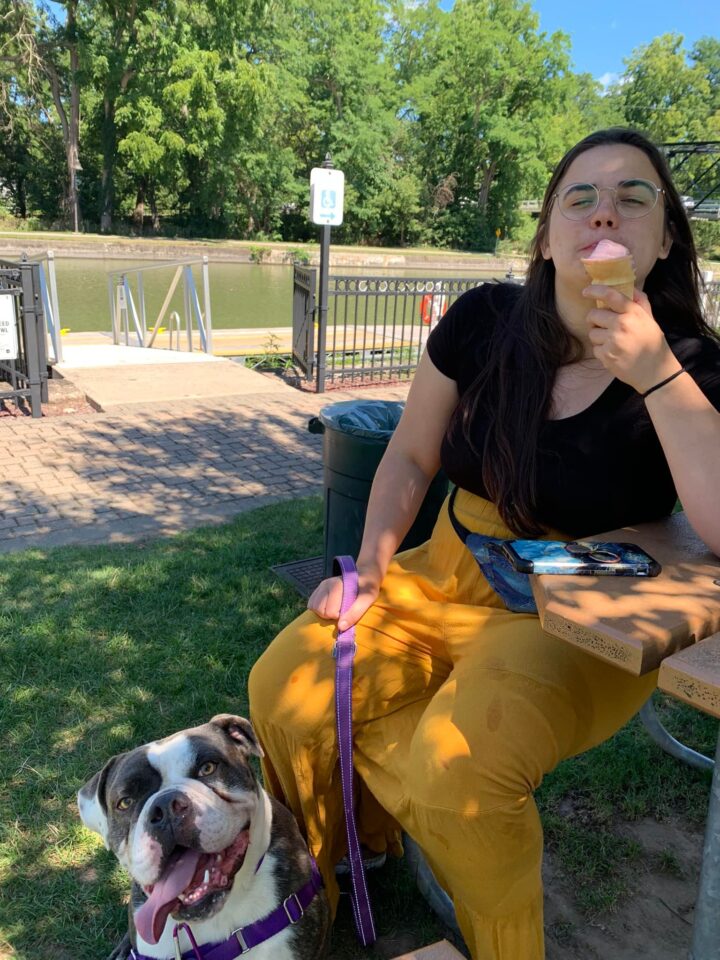
Launches Doggy day out
New program is launched allowing community members to take pets out for time away from the shelter.
New program is launched allowing community members to take pets out for time away from the shelter.
2022
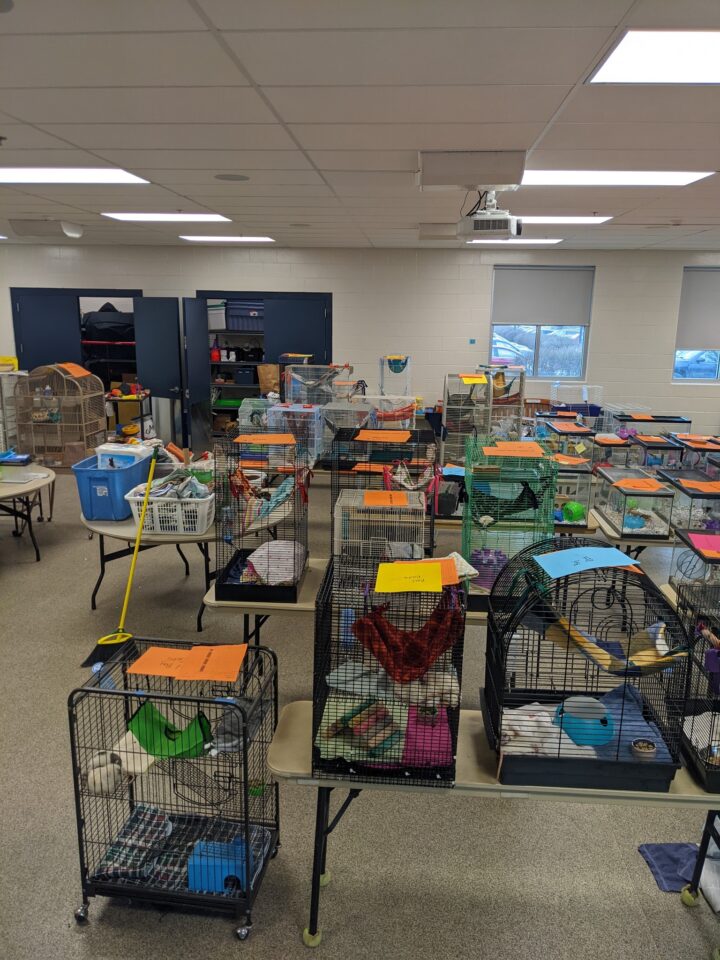
Lollypop Farm Rescues Nearly 800 Animals from Inhumane Conditions
Working in conjunction with the United States Department of Agriculture (USDA) and Department of Environmental Conservation (DEC) police officers, Lollypop Farm Humane Law Enforcement Department investigators discovered hundreds of animals, both domesticated and exotic, living in inhumane conditions. Reaves has been charged with failure to provide proper food and drink under Section 356. Nearly 800 animals, including rats, mice, guinea pigs, degus, ferrets, and rabbits, were seized from the facility.
Working in conjunction with the United States Department of Agriculture (USDA) and Department of Environmental Conservation (DEC) police officers, Lollypop Farm Humane Law Enforcement Department investigators discovered hundreds of animals, both domesticated and exotic, living in inhumane conditions. Reaves has been charged with failure to provide proper food and drink under Section 356. Nearly 800 animals, including rats, mice, guinea pigs, degus, ferrets, and rabbits, were seized from the facility.
2023

Present
150th Events
Some occasions are too big for just one celebration. Join us throughout the year as we celebrate by continuing to better the lives of animals through justice, prevention, and life-saving care. See All Events
Celebrating Success Stories
What better way to commemorate 150 than by sharing the countless stories of the people and animals whose lives Lollypop has helped change?
Submit Your Story

Dexy
I adopted Dexy a month after moving into my apartment in 2021 in Henrietta. We found each other through the “Seniors for Seniors” program. It’s free. I was 71 and he was 11. Adopting Dexy was the best decision I’ve made in years! He is as active as a youngster and loves to cuddle with…
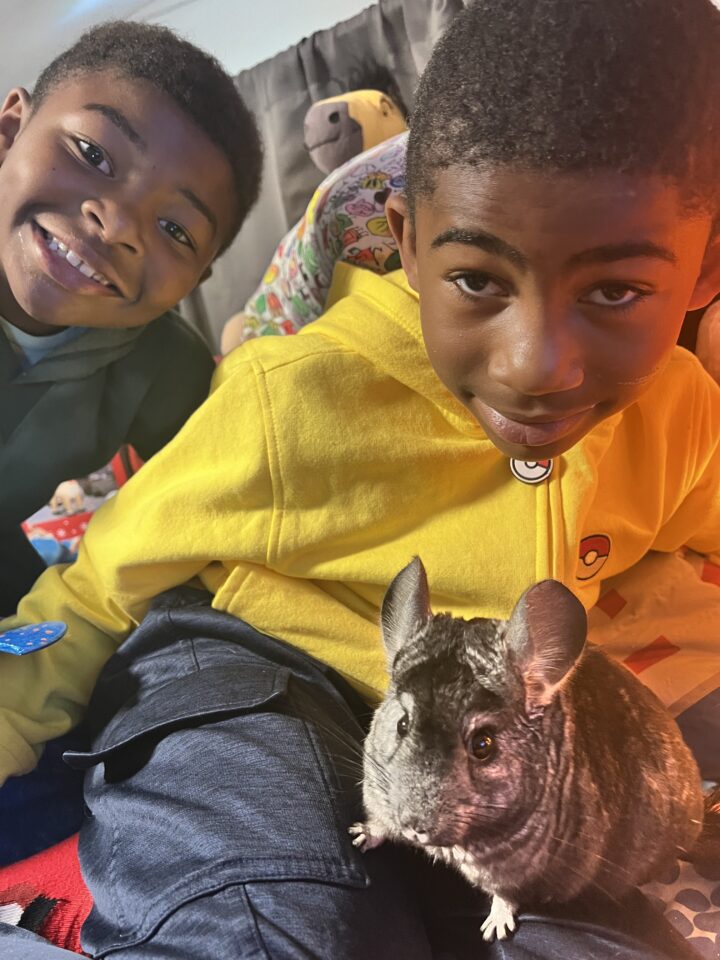
Shelly
We were so lucky to meet Shelly at Barktober Fest and quickly fell in love. Not long after we came back to meet her. The simple and quick process of adoption made it easy to have her join our family. She’s already well loved! – Avery Stanton
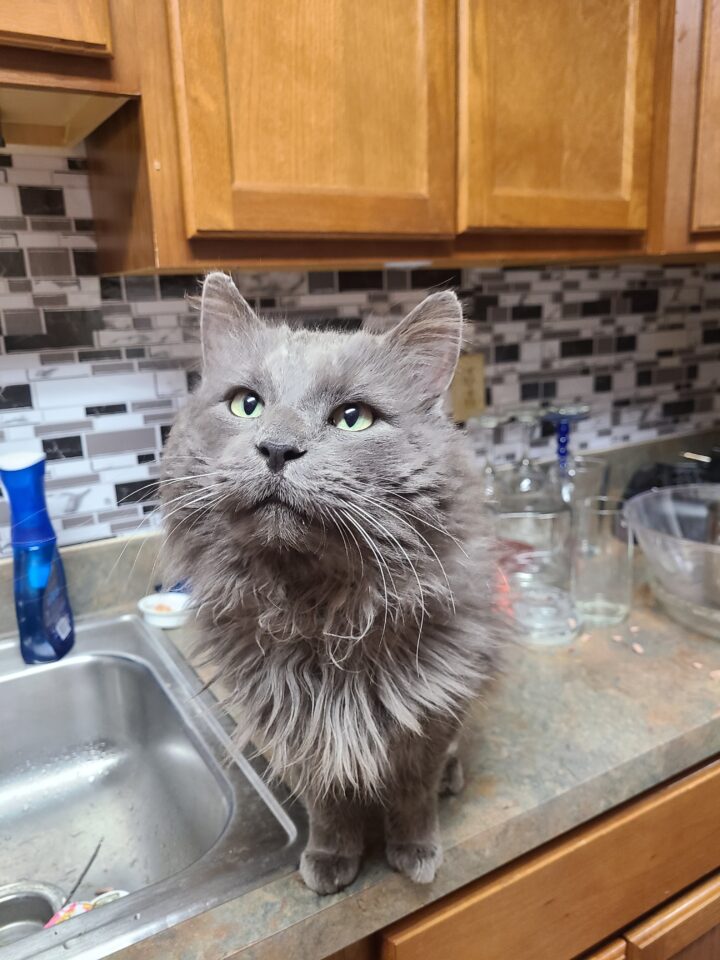
Love and Care
I was fostering this handsome boy, he’s the biggest love bug you could meet but is FIV+ and I was running out of time/having difficulty trying to find him a good home. I contacted Lollypop Farm about taking him in and finding a new owner for him and they set up a meeting right away…
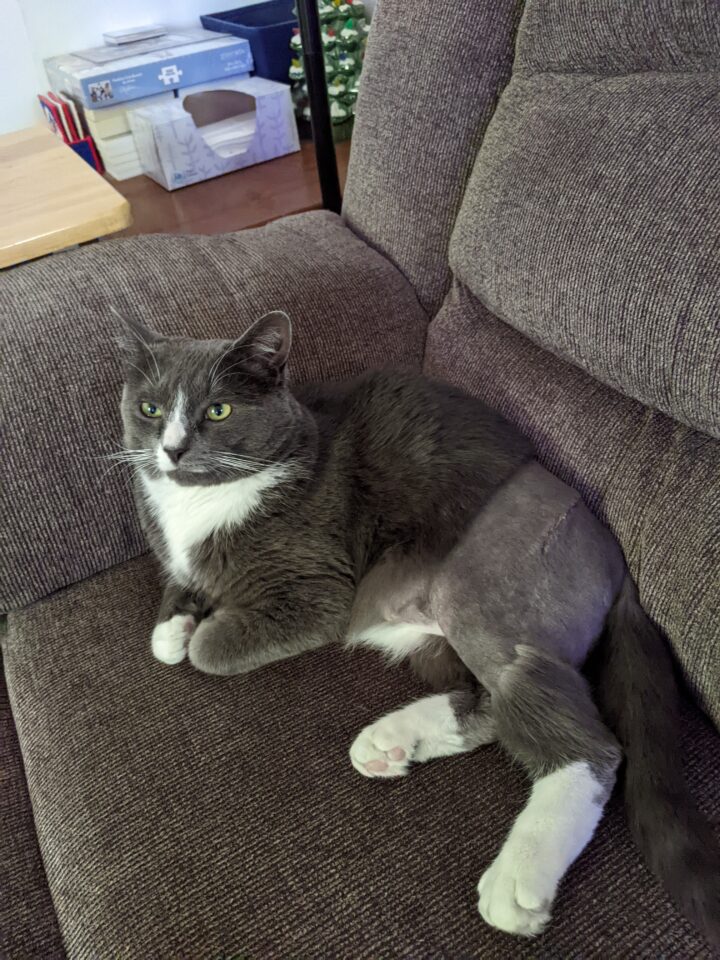
Vance
Lollypop Farm has been extremely helpful and generous by allowing Vance to be personally treated when he became injured and then I was able to get him back home to fully recover. He was adopted by me originally when he came to Lollypop at 2 months old and transferred to the Pet Supplies Plus Location…
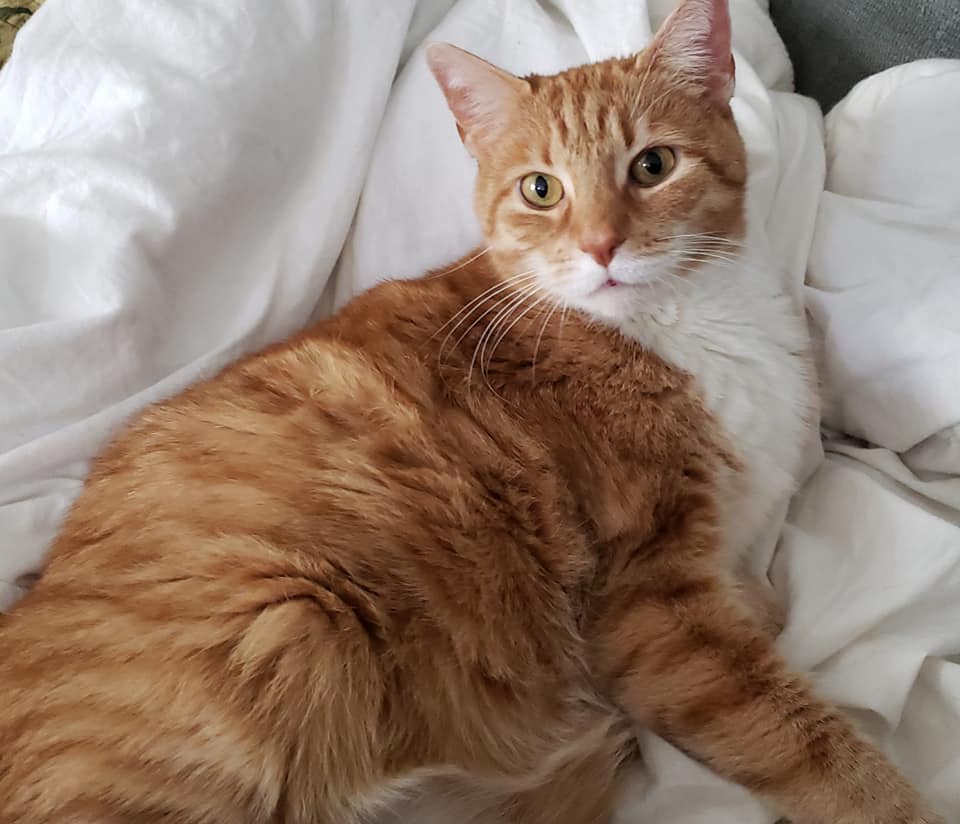
Lucy
I have always been more of a dog than cat person, but when I saw Lucy, I think it was 12 years ago now, at the location that used to be at Greece Ridge Mall, I had to have her. She was just a little orange cute fur ball. She has been the best catdog,…

Shop 150th Merch
Show your love for Lollypop Farm with some limited edition 150th anniversary merchandise. All proceeds go toward bettering the lives of animals in our community.
Donate to help make the next 150 years even better.
As a registered 501(c)3 nonprofit organization, we rely entirely on your generosity to help provide the life-saving care, shelter, education, and training.

Lollypop Farm
Lollypop Farm, the Humane Society of Greater Rochester, has been helping animals and people since 1873. Support from the community enables around 115 staff members and more than 800 volunteers to care for around 10,000 animals each year and makes possible a variety of programs to address issues that contribute to the surrender of unwanted animals.
